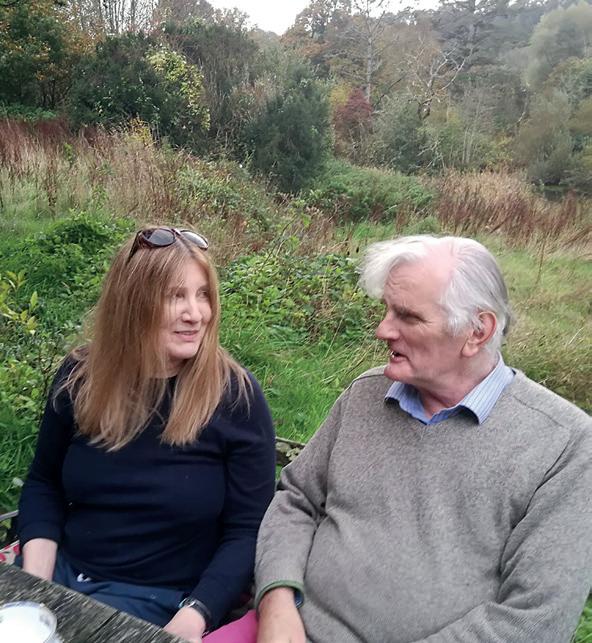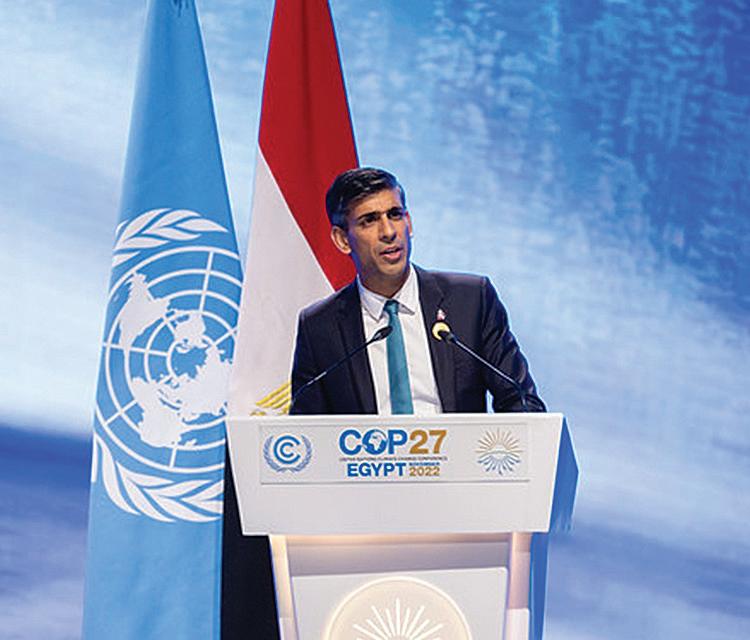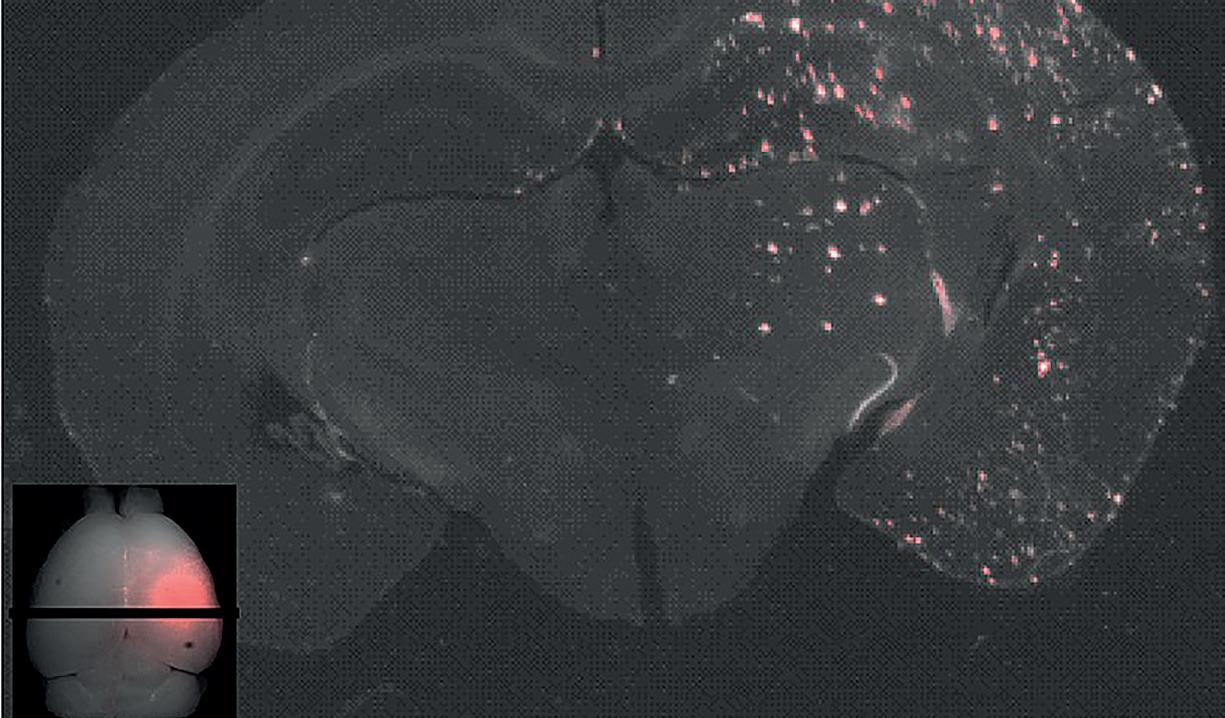Parents open parliamentary petition for ‘Harry’s Law’ following death of Exeter student
THE parents of third year Exeter student Harry Arm strong Evans, who died in June 2021, have launched a petition calling for universities to be legally re quired to publish their yearly suicide statistics and the departments in which these occur, in the hope that more ac curate information can help prevent other students’ deaths. Following the inquest into Harry’s death, University of Exeter Vice Chancellor Lisa Roberts was sent a ‘Report to Prevent Future Deaths,’ and the coroner, Guy Davies, criticised the University’s failure to res pond to Harry’s “cry for help,” in the midst of an “acute mental health crisis.”
Exeposé sat down with Harry’s pa rents, Alice and Rupert, to share their son’s story and talk to them about why they are petitioning for ‘Harry’s Law.’
When Alice and Rupert Armstrong Evans first talk to us about their late son, Harry, they paint a picture of a happier time. Talking of Harry’s early years, Alice recounts how he, “was the only boy for three years in that school in a class with nine other little girls. He used to get inundated with Valentine’s cards! He was always Jesus in all the Christmas plays, that sort of thing.”
“He was quite a large person, as in, he was gangly.” She goes on. “He was tall for his age. He was a big baby, and later he was the tallest in the class.”


After this upbringing, Harry went to a coeducational primary school in Dor set, in Port Regis. “He did all the usu al things — he won a prize one year in one of the classes, and he developed his own little character, I think really. He was left-handed and he had the most beauti ful handwriting ever. That was one of the reasons I think they offered him a scholarship. Then he won a scholarship to go to Winchester College. And he got the headmaster’s prize to get in there.”
Alice begins to tell us that, “he re ally wasn’t sporty,” as a child but Ru pert jumps in. “Well you say that,
he rowed and he did croquet,” and both laugh. “But he wasn’t really your cricket and rugby type,” Alice says.

“In his house at Winchester, in the first year, there was this wonderful, or nate desk… All the boys have to stand up, and the tallest boy gets given this fabulous desk. And that was Harry.
Its just a little thing, but it sort of sticks in my mind. Really he was much taller than the others. But a quiet, kind person.”
Alice and Rupert tell us how Harry re ceived three offers of university places, but chose Exeter because, “he’d been a long way from home before [for school], and being close and able to come back at the weekends we thought would be a good idea.

Once Covid started in March 2020, he moved back home and stayed home the whole of that year and did his final year exams from home. He returned, just befo re January to do his exams, but he got the re a bit early because he wanted to really go for it and get good results.” Alice explains.
Despite a strong previous academic record, Harry failed his January exams. “It seems that that somehow, you know he didn’t do well and he messed them up for whatever reason,’ Alice tells us.
‘We’re really not quite sure why, but at one point he told me that he hadn’t properly uploaded the one exam that he thought he’d actually done quite well in.”
“I believe it was at that point he as ked his tutor when he could resit this exam. And I think it was then that his tutor told him that if those exams were resat they’d be capped at 40%. My under standing is that this made Harry descend into some sort of depression. He never actually took another exam after that.”
Open letter calls for Freedom Society to apologise over ‘insulting’ event


MULTIPLE University of Exe ter Students’ Guild societies, including Be the Change, Fe minist Society and Labour Society among others, penned an open letter against Free
dom Society, in which they urged it to re consider its ‘Pint and Policy’ event ‘Daddy Issues: The Crisis of Fatherlessness,’ which took place on Thursday, 10th November.

The event was held at Old Timers Wine Bar and Restaurant, and hosted student Albert Dalan to speak about the ‘devastating diag nosis of our modern crisis of fatherlessness.’
At the event itself, Dalan argued that “fatherlessness is one of those epidemi cs which many people do not seem to talk about that much.” He expressed concerns that households without fathers lacked balan ce for children, stating, “Every society past and present had both the concept of a father and a mother, or a male role model. As we know, in this family structure, children learn different dynamics from both parents. As we know, mothers provide us love and comfort, while fathers teach us important values.”
Dalan went on to say, “More and more children are being raised without fathers, which represents a structural
weakness in the institution of the family.”
In an open letter shared on societies’ social medias the day of this event, prior to the event being held, a group of Students’ Guild societies heavily criticised the event as being, ‘damaging to the university’s ethos of inclusion and diversity.’ The letter called on the Freedom Society to ‘outline [their] reasoning behind’ the supposed ‘dange rous negative effects on society,’ caused by ‘fatherlessness,’ which were mentioned in the event’s description on Instagram.
The letter went on to state that many members of the signatory societies ‘have been raised solely by [their] mothers’ and ‘feel empowered by this, not impeded’. The socie ties urged the Freedom Society to ‘reconsider the contents of this event’ and ‘to issue an apology in light of the hurt caused by this.’
FREE ISSUE 738 23 NOV 2022 exepose.com @Exepose THE UNIVERSITY OF EXETER’S INDEPENDENT STUDENT NEWSPAPER SINCE 1987
News Team
The South West’s Best Student Publication Exeter students raising money for Movember Page 4
Print
exeposé
Image: Movember Foundation, Wikicommons Interview continued on page 6 THIS ARTICLE CONTAINS CONTENT RELATING TO SUICIDE WHICH SOME READERS MAY FIND DISTRESSING
COP27 Page 5 Continued on page 3 Image: Freedom Society SCAN
Megan Ballantyne and Charlie Gershinson Editor and News Editor
Exeter takes
HERE
Editors
Devonshire House, Exeter, Devon, EX4 4PZ
Print: Megan Ballantyne & Joshua Hughes
Online: Ana Anajuba & Clemence Smith
Deputies: Livvy Mason-Myhill editors@exepose.com
Executives
Social Media: Nancy Stitt Events: Georgia Balmer
Chief Photographers Rachel Cunningham Kieran Moore
News Editors
Print: Amy Rushton
Online: Megan Haynes & Isabella Ankerson news@exepose.com
Features Editors
Print: Oliver Lamb & Austin Taylor Online: Catherine Stone & Maggie John International: Maeve Fitzpatrick & Ryan Gerrett features@exepose.com
Comment Editors
Print: Anabel Costa-Ferreira & Connor Goddard Online: Izzy Langguth & Kristen Taylor comment@exepose.com
Satire Editor
Print: Cleo Gravett Online: Archie Lockyer
Lifestyle Editors
Print: Pippa Bourne & Gracie Moore Online: Ruth Hetherington & Charlie Nadin lifestyle@exepose.com
Arts + Lit Editors
Print: Ella Minty & Joshua Smith Online: Gwenllian Page-Gibby artsandlit@exepose.com
Music Editors
Print: Megan Ballantyne, Joshua Hughes & Livvy Mason-Myhill Online: Mahnoor Imam & Lauren Jones music@exepose.com
Screen Editors
Print: Pollyanna Roberts Online Matthew Bowden & Harvey Isitt screen@exepose.com
Tech Editor Print: Harry Hawkins
Science Editors
Print: Daniel Pain & Hayley Power
Online: Daisy Scott & Imogen Poyntz-Wright sciandtech@exepose.com



Sport Editors
Print: Rob Worthington Online: Oliver Rickwood & Archie Rucker sport@exepose.com
Proofers
Joshua Hughes, Megan Ballantyne, Livvy MasonMyhill

FOR many the Football World Cup is a time for celebration, joy, nerves and above all else passion. However, the events in the build-up to the opening of the World Cup in Qatar have been anything but enjoyable. The deaths of thousands of migrant workers alongside the spotlight being shone on the restrictive laws in place in Qatar have put things in perspective and brought home a stark reality to many. Watching Morgan Freeman deliver his monologue during the opening ceremony and stating the message “We all gather here in one big tribe” has left many to question the involvement of celebrities and also the subtext of the message conveyed. Whether you’re watching the World Cup for pleasure or plan to boycott it, when watching the tournament, it is important to take into account the context in which this event is going ahead.
Closer to home, this week we were able to sit down with Alice and Rupert Armstrong-Evans, parents of Harry Armstrong-Evans to discuss the result of the inquest and also their work towards ‘Harry’s Law’. We have also linked a qr code to a petition on the front page which calls for the introduction of new rules regarding the suicide of higher education students. The interview can be found on pages 1, 6 and 7. In News we also cover COP27 and Exeter’s involvement at the conference (page 5) and an open letter
sent to the Freedom Society regarding a controversial talk (pages 1 and 3).

Elsewhere in this edition, Features look at the surge of Nigerian students coming to the UK (page 8), Comment discuss whether politicians belong on reality TV (page 10) and Satire debate the issue of turning back the TP clock for daylight raving (page 12). Lifestyle feature a recipe for winter warming (page 15) and Arts + Lit explain how sci-fi books tackle climate change ( page 16). Music look back at 25 years of Spiceworld and also look at Tiktok’s takeover of the Music industry (page 20). Screen writers discuss their favourite onscreen rain kisses and look at perfection in cinema (page 23) while Tech looks at Ticketmaster’s bot problem (page 25). Science looks at the discovery of the closest known black hole to Earth (page 28) and Sport covers Ronaldo’s fall from grace, the Brazilian GP and covers in detail the issues facing the Qatar World Cup (pages 30, 31 and 32).
November is the time of the year when the days are getting shorter, nights are getting colder, and the reality of work is starting to hit home for many. While it can be viewed as doom and gloom, the end of term is around the corner and with it, a well-deserved break for all. We hope everyone is keeping well during this time — its only five weeks till Christmas!
 and Megan
and Megan

University news home and abroad
THE supermajority conservative U.S Supreme Court continues to push against precedent, turning this time to affirmative action. In October, the court heard two cases, against Harvard University and the University of North ern Carolina, both filed by the conservative group Students for Fair Admissions (SFFA).
The SFFA claims that Harvard’s undergradu ate admissions process discriminates against Asian American applicants, while the Uni versity of Northern Carolina’s recruitment of low-income and first-generation students disadvantages white and Asian students.
The landmark case Grutter v. Bollinger (2003) upheld the Regents of the University of California v. Bakke (1978) ruling that where race is not the sole determinant and quotas are not used, affirmative action does not violate the 14th Amendment. The SFFA seeks to overturn this decision by arguing that any con sideration of race in the admissions process is a violation of the clause. If successful, many colleges would be forced to utilise race-neutral approaches. Officials from Michigan and Cali fornia, states where race-conscious admissions are banned, warn that this move would reduce diversity in affected campuses. The Supreme Court is expected to make a ruling in June.
MANY Nigerian cities have experienced heavy flooding this month, closing univer sity campuses across the country. The disaster management agency NEMA estimates 600 people have died and 1.4 million have been displaced as large swathes of property have been destroyed.
Bayelsa State in South Nigeria is one of the most severely affected, where universi ties Niger Delta and Federal Uni versity Otuoke are completely inundated.
This is a serious blow to students prepar ing to return to classes after the eight-month lecturer strike by the Academic Staff Union of Universities (ASUU), called off on 14th October. Online learning is being considered for students taking professional exams but the high level of disruption continues to negatively impact students' education.
THE Norwegian government has proposed tuition fees for nonEU students and cuts to study abroad grants for Norwegian students and research collaboration programs. Stu dents have protested against the proposed measures in Oslo, Ås, Stavanger, Levanger, Bodø, Trondheim, and Volda. President of the Association of Norwegian Students Abroad (ANSA)
Anna Handal Hel lesnes said they are, "worried and disappointed that the Norwegian gov ernment now suggests that the individual stu dent should carry a greater burden through increased loans from choosing to study abroad — which the governmental strategies highlight the value and importance of." Norway's Min ister of Research and Higher Education Ola Borten Moe said about the proposed measures, "Norway shall still be open for students from abroad, but we think they should also pay for their studies here".
THE National Union of Stu dents has dismissed its President for the first time in the organisation’s history after an enquiry into antisemitism allega tions discovered “significant breach es” of organisation policy relating to comments made by Shaima Dallali.

The Union of Jewish Students prompted an investigation into alleged past comments made by Dallali includ ing her 2012 tweet, “Khaybar Khaybar O Jews … Muhammad’s army will return Gaza,” referencing a historical massacre.

Dallali issued an apology for this tweet but denies being an antisemite, saying to The Guardian , “This idea that I don’t like Jewish people, or…the Jew ish community, is absolutely not true.”
The dismissal came after increased pressure on the NUS to address longstanding antisemitism issues, a process which is still ongoing. While the NUS panel’s decision over Dallali’s dismissal may be subject to appeal, Chloe Field, Vice-President of the NUS, has been appointed acting chair of the NUS UK board until a new president is elected.
EXEPOSÉ
The opinions expressed in Exeposé are not necessarily those of the Exeposé Editors nor the University of Exeter Students’ Guild. While every care is taken to ensure that the information in this publication is correct and accurate, the Publisher can accept no liability for any consequential loss or damage, however caused, arising as a result of using the information printed.
Publisher cannot accept liability for any loss or damage to artwork or material submitted. The contents of this, unless stated otherwise, are copyright of the Publisher. Reproduction
requires the prior consent of the Publisher.
Advertising editors@exepose.com
The
in any form
Editorial
Josh
By Orianna Xu, Catherine Stone, Elen Johnston and Helena Hughes
US Supreme Court hears cases on race-based college admissions
Nigerian flooding stops university classes
Protests staged in Norway over non-EU student fee plan
NUS President ousted over antisemitism allegations
@exepose facebook.com/exepose issuu.com/exeposeexeter @exepose SPA AWARDS 2020 Best Publication 2022 Best Publication in the South West Images (top to bottom): Negative Space, Lucas Destrem, Wikimedia Commons, Kaboompics, Pexels, Wikimedia Commons ARTS + LIT The art of subjective collectivism PAGE 17 Defrosting Exeter: tips on saving money PAGE 14 LIFESTYLE SCIENCE The salmon run PAGE 29 TikTok's takeover of the music industry PAGE 20 MUSIC Image, Johnathan, Flickr
Continued from front page...
Addressing the open letter at the event itself, Freedom Society President James Baker said, "Welcome to the first ever Pint and Policy event which has had an open letter signed against it. Needless to say we are unfazed."
The societies involved in signing the open letter argued that the event, and the way it framed the idea of ‘fatherlessness' in the event description was, ‘outdated,’ ‘misogynistic’ and ‘ludicrous.’ A spokesperson for Labour Society told Exeposé “Upon seeing the event, we were disappointed to see Freedom were running an event on the ‘Crisis of Fatherlessness,’ backed by misleading statistics and offensive sweeping statements.”
[The event is] backed by misleading statistics and offensive sweeping statements
Labour Society
Feminist Society told Exeposé “Their suggestion that fathers are the ‘quintessential cornerstone of a strong family’ is outdated, ludicrous, homophobic, misogynistic and quite frankly ridiculous. Family dynamics and systems are far too complex issues to be debated upon and discussed in a Pints & Policy, especially in
such an inadequate and callous way.” All Hands Together similarly accused the talk of being “dishonest about the true diverse nature of modern families” by “referring to fathers as the 'quintessential cornerstone of a strong family' and portraying them as victims who are being excluded from families.”
Family dynamics and systems are far too complex issues to be debated upon... in such an inadequate and callous way
Feminist Students
Socialist Students further suggested that “incidents such as these contribute to a hostile, intolerant, exclusionary enviroment and undermine the ethos of the Students' Guild and the Univeristy as a whole.”
Some societies also emphasised that, rather than having an issue with the event as a whole, the ‘wording and phrasing,’ of its description was their key issue, with the Liberal Democrats telling Exeposé : “Exeter University Liberal Democrat’s affirm our commitment to an open and tolerant society, where everyone is welcome and accepted. We also affirm our commitment to free speech and passionate debate. Both things can and must exist side by side. We do not oppose
Freedom Society’s event, rather it’s framing and wording.” They also repeated the call on Freedom Society which the societies had made in the open letter to “issue a formal apology to those who have been impacted by their actions."

Freedom Society gave the following statement: “The open letter against Freedom Society was a strange and underhanded attempt to interfere with a private, voluntarily attended event on the pretext it may upset some feelings. The talk was of close personal significance to the President, and focused on the important societal issue of fatherlessness. The plight of young boys who grow up without a father figure is a well documented and thoroughly researched social phenomenon that we wanted to address. Our event went ahead, full of energy and with record attendance — so keep the open letters coming!” A longer statement issued by Freedom Society also suggested this open letter was an attempt to “defame” the society.



A spokesperson for the University of Exeter said: "Student-organised events such as this allow participants to debate and oppose topics that they may not necessarily agree with. The University of Exeter is committed to the protection of freedom of speech and events will go ahead providing they are within the law.”
A spokesperson for the
Students’ Guild said: “As your Students’ Guild, we want to foster an environment where our members can participate fully, feel able to question and challenge, express new ideas, discuss controversial and or unpopular opinions within the law, and all without fear of intolerance or discrimination.
We are committed to the principle that both debate and deliberation should not be suppressed, and we encourage and support our members to engage, within the law, in both a constructive and responsible manner to contest any ideas they oppose openly and vigorously.”

Students’ Guild takes part in 16 Days of Action to challenge violence against women and girls
Amy Rushton News Editor
THE Students' Guild, in partnership with Exeter University, Guild societies and external services, have launched their plans for 16 Days of Action, an international campaign against gender-based violence.
The annual campaign will run from the International Day for the Elimination of Violence against Women on 25th
November to Human Rights Day on 10th December. Started at the Women’s Global Leadership Institute in 1991, it aims to raise awareness at a local, national and international level and demand change to end violence against all women and girls.
At Exeter, 16 events will take place across the 16 days of action. The Guild will work with various charities and campaign groups, including Splitz/Fear-less, Devon Rape Crisis and sexual abuse services, Revenge Porn Helpline, Intercom Trust and Karma Nirvana, alongside student societies. This will encompass too the annual Reclaim the Night march, which sees hundreds of attendees each year in Exeter.
The events and actions planned will begin with a 'Gals and Nonbinary Pals Social' with Women and Law, Labour, Feminist, ProChoice, UN Women and Socialist societies, the proceeds for which
will go to Devon Rape Crisis and sexual abuse services. This will be followed by further events, including a flash mob choir in the Guildhall Shopping Centre, organised by Devon Rape Crisis, a forum stall encouraging student participation, and a tour of the recently opened safe space at St Stephen’s Church in town.
Some events will centre on external charities or call for increased attention to specific issues. These include spotlights on Devon Rape Crisis, Revenge Porn Helpline, Fear-less and a focus on the specific support available for sexual abuse and domestic violence in the LGBTQ+ community.
protest which has featured in cities across the world since 1977, will take place on 1st December, beginning at St Sidwell’s Community Centre and ending with a rally at Bedford Square.
Last year’s event saw over 500 people march through the city centre. Caroline Voaden, CEO of Devon Rape Crisis, spoke to Exeposé about the march: "Our Reclaim the Night march was the biggest one in the country last year... It's about reclaiming the streets, saying these are our streets and we should feel safe in the streets at night."
The full list and details of events are featured on the 16 Days of Action website.
Reclaim the Night, the annual
A spokesperson for the the Students' Guild stated, “These events raise awareness, demand change and remind us all that violence and harassment is still an ongoing concern for women in Devon as well as across the globe, and that it is a human right for us to be able to feel safe out on the streets where we live.”
A University spokesperson said on the event: "We are pleased to be working with the Guild to support their programme of events for the 16 Days of Activism beginning on 25 November. We are committed to continuing to improve student safety, led by the University Gender Safety Group, in conjunction with the Students’ Guild and key external partners across our Devon and Cornwall communities, and through the Community Safety Partnership in Exeter. This includes the launch of a Bystander Intervention training programme for all students, the introduction of a new night bus to support students returning from the city, and improved lighting, CCTV, and the creation of a safe space in the city centre through the Home Office Safer Streets funding scheme.
23 NOV 2022 | EXEPOSÉ 3 NEWS Image: Image:
16 Days
Global
Campaign
Some events will centre on external charities or call for increased attention to specific issues
“Outdated, ludicrous, homophobic, misogynistic and quite frankly ridiculous”
Exeter Movember aims to reach heights of 2021
STUDENTS at the University have been busy raising money for Movember and have so far raised over £60,000 this year. Organisers and fundraisers alike are aiming to reach and break last year’s amount of £127,567.50. Several events have taken place over the past two weeks with ‘Brave the Shave’ and ‘Move4Movember’ both being successful for the organisation.
Archie
Ambassadors stated “We are extremely proud to say that Exeter Movember has just smashed through half a million pounds raised for the Movember charity. The only university ever to do so! Since fundraising for Movember began in 2015, the students of Exeter raised over £500,000, and this is just the beginning! This month, students from all across the university are growing, moving and hosting to raise much needed funds for Movember. Keep an eye on the Exeter Movember Instagram to find out about all the upcoming
events, including Brave the Shave, Move4Movember, Mo-lympics and Exeter's Big Dip. Mo Well!” Exeposé also spoke to Nicholas Lau, who at the time of writing has raised £3,955.00, the highest individual amount at the University (and almost £1000 more than last year’s individual highest at the University). Nick said “my main motivation for supporting a cause like Movember is to spread awareness and redefine for a lot of people, the definition of being a man. I grew up thinking that even as a young boy, I had to hide my emotions, and that feeling low was a sign of weakness. Over the years I’ve learnt that seeking or asking for help isn’t something to be ashamed of, but instead it is a sign of strength and courage. No man should feel ashamed of his feelings. I hope that through growing a mo and doing challenges I can help create more open conversations about men’s mental health, and that more men can become more comfortable with who they are and how they feel.”
A spokesperson from the University of Exeter said “we are very proud that there is now a strong tradition among our students of raising significant funds for Movember. It started in 2016 and last year our students’ efforts were recognised with a special Movember award. We are delighted that they look set to pass such an incredible fundraising milestone this year. More important, is the awareness raising about health, and mental health issues among men, who are traditionally less likely to seek help. We encourage any student who needs support to contact our wellbeing services in Devon and in Cornwall. We are putting on some wellbeing-led events throughout this month to complement the student initiatives – such as a Wellbeing Fair and Paws for a Chat with Scout the Therapy
Dog. There will also be the chance to take part in a Lego Serious Play session. We’re finalising the events at the moment and you’ll find details on our wellbeing talks and activities pages as well as via your weekly University Updates.”
A spokesperson from the Guild stated that “we are incredibly proud of all of the students involved in organising events and raising money for such a great cause. To officially be the first university in the UK and Europe to have raised over £500,000 for Movember since 2015, really is a testament to the amazing students we have here at Exeter. If you would like to get involved with any Movember events, check out our Instagram Guide (@ExeterGuild) which contains events organised by various societies and clubs.”
For those who want to get involved with Movember and learn more about the organisation, go to: https://uk.movember.com/ register and to check how Exeter are doing go to https://movember. com/n/exeteruni?mc=1.

Devon Rape Crisis CEO to meet with D&C Police and Crime Commissioner following open letter condemning misogyny in the force
Megan Ballantyne and Livvy Mason-Myhill Editor and Deputy Editor
THE leaders of two women's organisations in the South West have urged the Police and Crime Commissioner for Devon and Cornwall Police, Alison Hernandez, to do more to combat sexism and misogyny in the force following a damning national report.


After His Majesty's Inspectorate of Constabulary and Fire & Rescue Services (HMICFRS) conducted an investigation into misogyny in the police and police vetting standards, the report from this investigation found that vetting standards were not high enough and it was "too easy for the wrong people to both join and stay in the police," Caroline Voaden, CEO of Devon Rape Crisis & Sexual Abuse Services, and Jackie May, CEO of the Women's Center Cornwall, decided to put out an open letter to address the issue and send a “strong message,” to the police that misogyny will not be accepted. The pair are set to meet with Alison Hernandez to discuss their concerns around women's trust in the police expressed in this letter.
In their open letter to Police and Crime Commissioner Alison Hernandez, Caroline Voaden
and Jackie May draw attention to the HMICFRS report as well as the damning report from the same watchdog last month, which placed Devon and Cornwall Police under "special measures" due to its slow call response times and insufficient management of sexual and violent offenders.
The letter noted a 19 per cent rise in the number of rapes and sexual offences registered by Devon and Cornwall police in the year ending September 2022. It also stated that only one to two per cent of the 2,566 reported offences would likely result in a charge based on past statistics, and that even fewer would result in a conviction, calling this a historic low that is a disgrace for victims.
Caroline Voaden spoke to Exe posé about what motivated her to put together this open letter: “Very very few women ever see justice from the criminal justice system, so we know that there are many women out there who have had a difficult experience with the criminal justice system, or who have chosen never to begin that process. And then there comes this report which says that the police is absolutely rife with misogyny, sexism and predatory behaviour. Even I find that quite shocking. I mean, we know that there is misogyny in the police force… but to hear that
almost every single female police officer who was questioned in that research, almost all of them said that they had witnessed or been subjected to predatory behaviour, I just find it deeply, deeply shocking. You have to wonder, is it any surprise that women don’t see justice from a system which is itself so embedded with misogyny.”
The HMICFRS report found that there were "too many cases where people should not have been allowed to join the police, including officers with criminal records or links to organised crime." THis was according to the HMICFRS assessment after it reviewed hundreds of police vetting files.
Inspectors "also observed occasions when indications that a prospective officer may constitute a risk to the public was ignored," according to their findings.
The watchdog organisation HMICFRS states: "HMICFRS said there were incidents which should have been assessed as gross misconduct that were assessed as misconduct only, or not treated as misconduct at all”. HMICFRS further went on to say that the inspectorate came to the conclusion that many forces still have a misogynistic, sexist, and predatory culture that extends to female police officers, staff members, and members of the public.
23 NOV 2022 | EXEPOSÉ 4 NEWS
Image: Ollie Harding, Wikicommons
Spicer, one of the University of Exeter’s Movember
Joshua Hughes Editor
No man should feel ashamed of his feelings
Image: Movember Foundation, Wikicommons
The University of Exeter at COP27
 Elizabeth Barber Reporter
Elizabeth Barber Reporter
RESEARCH from the University of Exeter featured at events during the COP27 climate talks, and will help shape the discussions around how the ongoing climate emergency can be addressed. Several researchers attended the summit in person, while several more were able to attend the events virtually.
Research and projects from the University of Exeter included the ‘Overshoot and what it means to exceed 1.5°C’ event,
hosted by the IPCC and featuring Exeter’s Professor Richard Betts MBE, from the Met Office, and the ‘Global Carbon Budget 2022: Announcement Session at the World Climate Summit’, featuring Professor Pierre Friedlingstein, from Exeter’s Global Systems Institute, who leads the Global Carbon Budget.
The University of Exeter has a number of influential climate scientists, and over 1400 research and education specialists working to understand the meaningful and urgent actions that could be taken in relation to the environment and climate change.
The Student’s Guild on COP27:
It’s always great to see students who are passionate about the environment and climate change. Emma de Saram (VP Liberation & Equality) has recently been to the EUniverCities conference in Austria where she networked with other members from Universities across Europe on sustainability, climate change resilience and many other topics. Emma is planning some exciting events and more information will be released soon. Through our involvement with the NUS, we have signed up again for Green Impact which will support us with environmentally and socially sustainable practice at the Students’ Guild.
A spokesperson for the University of Exeter said: “Our involvement in COP27 has been monumental, with a wide range of University of Exeter experts, research and projects featuring at the climate talks in Egypt.
Several Exeter researchers, students and colleagues attended the summit, while many more joined events online, with Exeter research — including contributions to key reports by the Intergovernmental Panel on Climate Change (IPCC) — helping to inform the COP27 discussions.
Further to the University’s Environment and Climate
Emergency Declaration in 2019, we have been making changes across our Devon and Cornwall campuses, such as introducing sustainable travel, ensuring sustainability across our energy and water supplies, introducing sustainable labs, encouraging the importance of managing waste and recycling, incorporating sustainability within our construction and refurbishment plans, biodiversity, making sustainable choices when offering food and drink on campus and of course incorporating sustainability as a vital factor in our education and research.”
The University on COP27:
Our involvement in COP27 has been monumental, with a wide range of University of Exeter experts, research and projects featuring at the climate talks in Egypt. Several Exeter researchers, students and colleagues attended the summit, while many more joined events online, with Exeter research — including contributions to key reports by the Intergovernmental Panel on Climate Change (IPCC) — helping to inform the COP27 discussions. We also launched the Global Carbon Budget Report in collaboration with the Global Carbon Project team, produced by an international team of more than 100 scientists, which examines both carbon sources and sinks, projecting that atmospheric CO2 concentrations will reach an average of 417.2 parts per million in 2022, more than 50% above pre-industrial levels.
Exeter’s ‘We Still Have a Chance’ project features at COP27
Amy Rushton and Harvey Freeman News Editor and Contributor
AUNIVERSITY of Exeter Green Futures project, presenting 12 climate stories was showcased for the first week at COP27 in Egypt.

We Still Have A Chance: 12 Climate Stories for 12 Days of
COP27 builds on the legacy of COP26’s One Chance Left, to feature stories centred on the environment across the Blue (policy makers) and Green (public facing) zones of the conference. The project is an international and interdisciplinary effort, and featured not just in Sharm el Sheikh, where the conference was based, but in Cairo, Alexandria and Exeter as well. It was co-created by 150 climate scientists, activists, health
professionals, writers, artists and translators from both the UK and Egypt through virtual creative writing workshops using the themes of ‘water’, ‘food’ and ‘adaption’, and was written in both English and Arabic.
Project lead, Cecilia Mañosa Nyblon, said that the project connects “science, human health, art, and activism; the UK and Egypt; the Global North and Global South.” She explained: “Our stories have inspired a range of creative outputs — from digital recordings to theatrical performances in Cairo, Alexandria, Sharm El-Sheikh and Exeter. We hope these stories spark new ideas, possibilities, and energy to take urgent action to protect our planet. Time is running out, and we must act now.”
The creative outputs launched by the project include a visualisation by Jan Kamensky on what Cairo and Exeter would look like if we removed cars and created a space for people and communities by bringing back nature, and a mural artwork by Ramr Hemden, unveiled at the Jesuit Cultural Centre in Alexandria, Egypt and funded by The Knowledge E Foundation. This is one of three murals, the other two of which will feature in Cairo by December 2022 and Exeter by summer 2023. The Royal Albert Memorial

Museum is set to host a climate performance and panel discussion arising from the project. The Earth Turns event will dramatise six short climate stories in English and Arabic from We Still Have A Chance. Each story will be performed by the Cygnet Theatre, staged against the setting of a contemporary Egyptian tapestry from the museum’s collection. Alistair Ganley, Director of the Cygnet Theatre stated, “These moving and urgent stories present a deeply human perspective on climate change.”
This includes Mermaids Tears, a tale combining potent realism with Arabic folklore in which the melding of microplastics in the Nile is likened to a malevolent siren tempting a ship captain into the water. Following the performance, special guests from the University, RAMM and Met Office, will join in a panel discussion, where the audience will have an opportunity to explore how "facts, findings, and emotions offer hope and help catalyse positive solutions to safeguard our planet".
The event will take place at the RAMM on 2nd November between 6:30 pm and 8:00 pm. While booking is obligatory, admittance is free and a compelling opportunity to observe climate change through the lens of art and storytelling.
Sunken boat causes oil spillage in Exeter quay
Manon Martini Reporter
WORK to contain an oil and diesel spillage in the Exeter Canal following the sinking of a 44-tonne fishing boat on the 30th October has come to a close.

The spill was reported to have left a ‘strong smell in the air’ and an orange-brown sheen on the water’s surface. Absorbance pads have been placed along the canal to absorb the oil along with a series of booms to contain the spillage. The sunken boat has been craned out of the canal and now sits on dry land at Gabriel’s Wharf.
The sunken boat has been craned out of the canal and now sits on dry land
Exeter Council’s canal team were on site within 10 minutes of the incident being reported, and reportedly brought in a specialist contractor as well as Environment Agency to contain and absorb the spillage. An ongoing investigation into the ownership of the private vessel is underway as the council attempts to recover the costs incurred by the incident.
The local community were reportedly saddened by the incident after being warned against dog walking and water sports in this central location of natural beauty and outdoor activity.
Cllr Ruth Williams, Lead Councillor, commended the team for their swift response and said that she is currently seeking to impose a ‘Harbour Revision Order’ that will give the council the legal right to remove unseaworthy vessels from the canal in order to avoid such environmental disasters happening in the future.
23 NOV 2022 | EXEPOSÉ 5 NEWS
Image: Cecilia Mañosa Nyblon
Image: Diego Sideburns, Flickr
Continued from front page...

"He’d been doing pretty well up to that point." Rupert tells us. ‘So he was certainly in line for a 2:1 or possibly a first. And it was the fact that his results absolutely collapsed and nobody picked up on it." Harry got 21% in his January exams, after a previously sound academic record.
"I mean it can’t be possible that nobody noticed that he did really badly in his exams, and he’s done really well before. Nobody ended up explaining to him his options."
When Alice reached out to Wellbeing Services expressing concern for her son in May 2021, on multiple occasions, multiple technical and handling errors meant that her concerns were not followed up on. In the same month, Harry email his personal tutor and copied in the Wellbeing Services, saying ‘I have been in isolation in my virtually empty hall of residence.” He indicated that he had had some “significant personal problems” in the run-up to the exams, and that he’d "spent so much time isolated by myself in my flat with almost no human contact. It really has had an adverse effect on my mental health. I really struggled to think straight and the exams for me were a horrible culmination of my stresses.” No one from the University ended up speaking to Harry either in person or on the phone following this email or Alice's calls.


"You know it's all very well, to say, which is what the defense was, frankly, that everything [relating to welfare and support] is written down. But Harry really needed a human person to talk to as human beings, and he didn’t get that."
The coroner’s 'Report to Prevent Future Deaths,' given to Vice Chancellor Lisa Roberts, also criticised the University's lack of proactive engagement in Harry’s case, with coroner Guy Davies stating in this report: "Nobody from the university attempted to speak to or visit Harry despite numerous concerns being raised regarding his wellbeing. There was a total absence of personal engagement..." He went on: "Research has consistently shown that most students and staff who experience poor mental health do not access formal support. The university response was entirely by email and can be characterized as reactive. The evidence indicated a marked reluctance to respond flexibly
and proactively to concerns."
"Harry was very conscientious," Rupert tells us. "They said he turned up to every single tutorial and meeting that they had on the course and he was a perfectionist — if things went wrong he tended to blame himself and feel really bad about it. That doesn't seem to have been taken into account."

Alice elaborates, "I think he was deeply hurt that he couldn't resit his exams without that 40% cap. But he did try to help himself... He sent an email to his tutor, he was asking what his options would be to try and save his degree and what MSCs he could do — he was thinking of doing something in computing. But because it was the beginning of half term his tutor didn’t reply to it quickly. This is a letter which when I read it, you know, is somebody asking for help.
It’s just so upsetting because I know that my son would never have wanted to have killed himself. He just didn't
know any other route. And he didn't just go off and do it, he'd already tried to help himself."
Guy Davies also suggested that academic tutors at Exeter were ill equipped to deal with student mental health issues, and should receive suicide prevention training, stating in his report that, ‘The evidence [from the trial] indicated an absence of mandatory training for academic staff on suicide prevention and mental health awareness,’ and suggested that this was an area
the university should improve.
"This suggested training for academic staff is not in psychiatry or anything medical, but purely being able to flag up concerns, because there is no face-to-face training at the moment." Alice clarifies
Following their son’s death, Alice and Rupert tried to find accurate information about past student suicides from the University, but found it extremely difficult to do so. They believe there have been 12 suicides at
the University over the last six years, eight of which have been officially confirmed by a coroner. According to a National World report, 67 of 114 UK universities said they did not hold information on student suicide rates (59%).
"I tried to find out about suicide from Exeter University and they wouldn't tell me anything. I then had to send a Freedom of Information request. And I was given some information but really not a lot. It was just impossible to get a straight answer from university. This is what really has led us, to in some small way, to try to enable parents and friends and students themselves to know what universities’ suicide statistics are, and in what subjects."
In order to try to make information around student suicides more transparent, Harry’s parents have set up a parliamentary petition for ‘Harry’s Law.’ The law would require universities to release their yearly suicide statistics and the department in which they occur.
"What university would want there their numbers of suicides to be publicised? Of course they don’t. We would like it because hopefully there might be a competition between universities for the least number of suicides," Alice tells us.
23 NOV 2022 | EXEPOSÉ 6 NEWS
“What university would want their number of suicides publicised? Of course they don’t”
He was a perfectionist if things went wrong he tended to blame himself”
Rupert
Armstrong Evans
I tried to find out about suicide from Exeter University and they wouldn’t tell me anything”
Alice Armstrong Evans
Image: Alice Armstrong Evans
Image: Alice Armstrong Evans
"I mean [Exeter University] have been sweeping the information under the carpet because they initially came back with a a figure of suicides here about three." ‘Harry’s Law’ would also mean that universities could be placed into special measures by the Department of Education if their suicide figures exceed the national average.
Harry’s parents hope that, with accurate information on student suicides publicly available, universities will be forced to confront the issue, and that this information will also allow parents and students to make informed decisions about their education.
"If you don’t have the information then you don't have to hold up your hands and say there’s a problem. You just say we don't know. We have no information on that — end of story. Whereas if you have the number of people who’ve taken their lives published on your website, and which faculty they belong to, you can be absolutely sure that pastoral services and standards will have to improve...
At the moment, it's a race to the bottom, not a race to the top. There is no incentive." Rupert tells us.
Rupert and Alice also hope that the accurate information ‘Harry’s Law’ would provide can help universities to see patterns in student suicide rates, which could then inform their suicide prevention strategies.

"We are pretty much experts now on student suicide. I have noticed it frequently happens after they think they've done badly in exams. So if a student’s exams have gone badly, they should have those people who were his tutor, and his wellbeing department, informed...
Harry had done very badly considering what he'd done before, and they should have spotted that sign, which I can recognise today having only read about it."
Although Harry’s parents have spoken a lot about how universities can prevent student suicides, they also hope that ‘Harry’s Law’ and the results of the inquest into Harry’s death can change how universities view student mental health, and encourage them to be proactive in taking care of their students’
“The thing is its the tip of the iceberg." Alice tells us, "because for every student who regrettably takes their own life, there are probably a dozen more who attempted it, and a great number who are just unhappy. There must be thousands who are unhappy. And it's supposed to be one of the best times of your life. And for students to go to university and to be really unhappy, it’s tragic.”
Despite the tragedy they have faced, Alice and Rupert told us that the main message they would would like students to understand is that, "Things will get better and fall into place. There is always a future, there is always something else if something goes wrong.
[Young adults] just need to know that things can get better. No one needs to kill themselves because they did a bad exam. I would really love that message to get across.
Also, an anti-suicide charity called Papyrus found that talking to school children about suicide actually lessens suicides. And I think, if only I had a chat with my son about suicide. We could have said to Harry... we don’t care if you’re stacking shelves in Tesco, it really doesn’t matter. But no university degree is worth taking your life for. And I imagine most parents would think that."
MP for Exeter, Ben Bradshaw,
told Exepose when asked about his views on 'Harry's Law:' “I am totally supportive of 'Harry’s Law' and have been concerned for some time about how our universities and mental health services deal with students at risk and their families.


When I was a member of the
Health Select Committee I helped initiate and ultimately draft a major report into suicide, which identified serious shortcomings in the current approach and made a number of important recommendations on what needed to change. Sadly, none of these has been taken forward by the Conservative Government, while our mental health services and services in general have continued to deteriorate after 12 years of cuts.”
A spokesperson for the Students’ Guild said, "We understand the pressures that students face, academically, socially, financially and the need to have services that properly support our student community. Mental health, wellbeing and support is one of the Officers and Guild’s collective priorities for the year and we will continue to work collaboratively with the University on improving the provisions in these areas."


A spokesperson for the University of Exeter said, “We are deeply saddened by Harry’s death and the family's loss. We are carefully considering the Coroner’s detailed conclusions in this case. We continually review and improve the wellbeing support we provide based on evidence and learnings, including from rare tragic cases such as Harry’s, and we will learn the lessons to enhance our support and operations further, specifically in the areas
recommended by the Coroner. We are acutely aware of the current mental health challenges for young people and the difficulties facing external services and have invested significantly in student welfare and wellbeing support in recent years. Student health and wellbeing is always the University of Exeter’s top priority. We also welcome and support the recent Universities UK guidance on suicide prevention and their recommendation on a trusted student contact when there are serious mental health concerns. A significant number of the UUK recommendations have already been implemented at the University of Exeter, and we will implement all the recommendations.”

23 NOV 2022 | EXEPOSÉ 7 NEWS Image: Alice
No university degree is worth taking your life for”
If these issues affect you, you can get in touch with: Samaritans 116 123 Exeter Student Nightline 01392 724000 É
Alice Armstrong Evans
“Things will get better and fall into place. There is always a future, there is always something else if something goes wrong.”
I am totally supportive of Harry’s Law”
Ben
Bradshaw, MP
holding the cup)
Image:
Alice Armstrong Evans (Harry at the front
Image:
Image: Alice Armstrong Evans Image: Alice Armstrong Evans
Alice Armstrong Evans
Seizing the opportunity
ANEW post-study work visa scheme has seen an increase in Nigerian stu dents studying in UK universities.
The new visa, which allows inter national students to stay in the UK for up to two years after finishing their degree, targeted Nigeria as well as four other countries for recruit ment among students. The UK saw a 27 per cent drop in the number of Nigerian students being educated at UK universities from 2012 to 2017.
This has seen 21,305 Nigerian stu dents being enrolled in UK universities in the 2020-21 year, an increase of 64 per cent from the 2019-20 figure with anec dotal evidence suggesting 2022-23 will have an even higher Nigerian student population. This is supported by the Home Office’s total sponsored education visas reaching 486,868 — a record high.
An increase in Nigerian students en rolled in UK universities has also allowed their dependants to live with them in the country. Those who hold a special visa are allowed to bring a depend ant including a spouse, partner or child under the age of 18.
Nigerians have be come more willing to emigrate to the UK in recent years as multiple crises have gripped the country. Infla tion, for exam ple, has surged to a 17-year high of 20.5 per cent. Unemploy ment is rampant, with an unem ployment rate of 33.3 per cent and a youth unemployment rate of 42.5 per cent.
Not all of those mak ing use of the visa scheme are recent school leavers.
Theresa Abraham, a 50-year-old civil servant in Nigeria’s capital La gos, told University World News how she recently left for the UK with her fam ily to study for a master’s degree. Oth ers, such as Bola Popoaje, similarly moved to the UK with their family to make use of Britain’s amenities, such as free education for their children.
Nigerian students are often forced to sell most if not all of their worldly goods in their home country, as a student visa itself, excluding tuition fees of £9,250 and other costs such as accommoda tion, comes to $431 per person per year. Many Nigerians are forced to sell their
homes and cars, leaving them with no fallback plan in the country if their stu dent visa expires without an extension.
Fleeing the country, particularly for young people in Nigeria, is seen increas ingly as a necessity. With little prospect of a job, never mind a long-term career, young Nigerians are forced to take out loans from friends, family and all man ner of financial organisations with a view to repaying their loan(s) through work once they have arrived in the UK. This is all in the hope of finding stabil ity and a future within the UK economy.
However, there is some hope for those Nigerians who have not chosen to emigrate. The 2023 Nigerian presi dential election
capping the number of visas given out. Suella Braverman, the Home Secretary, has been reported to be contemplating measures such as restricting visa appli cations only to those who are studying high-demand subjects such as engineer ing while putting those hoping to study humanities subjects at a disadvantage. She is also planning to limit the num ber of foreign students able to remain in the UK after their visa has elapsed.

Special measures
This forms part of an effort to re duce overall immigration to the coun try. At the recent Conservative Party conference she claimed that the UK has “very, very high numbers” of lowskilled migrants who are putting “pres sure on our services, on our housing and on our community relationships.”
DEVON and Cornwall Police are facing increasing scrutiny over failures to properly tackle sexual violence and adequately deal with sexual offenders. They have been put in spe cial measures by the police inspectorate.
His Majesty’s Inspectorate of Con stabulary and Fire & Rescue Services has found Devon and Cornwall Police to be failing in three key areas: inconsist ent reporting of crimes against vulner able victims, failures to respond to 999 calls and being unable to protect the public from registered sexual offenders.
Devon and Cornwall Police [are] failing in three key areas




Conservative Police and Crime Com missioner for Devon, Cornwall and the Isles of Scilly, has said that “there are few surprises in this report”.

There have been substantial con cerns across other areas of the UK also. Devon and Cornwall Police have followed the Metropolitan Police, Gloucestershire Constabulary, Greater Manchester Police, Wiltshire Police, Staf fordshire Police and Cleveland Police into special measures. This comes after there were 70,000 unreported crimes and errors in stop and search in London.
There were 70,000 unreported crimes and errors... in London
will see the insurgent Peter Obi, governor of the Anambra region and Labour Party candidate for president, run against the old establish ment parties of the centre and centreright. Obi is running on a platform of anti-corruption which appeals to voters under 30 — self-styled ‘Obi-dients’ — and is currently running 16 points ahead of both of his establishment opponents.
As foreign students, including Nige rians, continue to make use of student visas, the government is contemplating
In response to these reports, an open letter to the Home Secretary by Universities UK, GuildHE, MillionPlus and University Alliance has harshly criti cised the plans. In the letter they say, “the negative rhetoric suggesting a need to reduce inter national student numbers is un helpful and coun terproductive […] Such rheto ric is also quickly reported on around the world, sending a message overseas that the UK is unwelcoming and hostile to inter national students. That is why we would urge the government to restate its com mitment to the ambitions set out in the International Education Strategy and to avoid language that suggests in ternational students and their depend ants may be unwelcome in the UK.”
Meanwhile, a recent report by SBM Intelligence has shown that Nigerian stu dents contribute a considerable sum to the UK economy. Nigerian students and their dependants contributed around £1.9 billion over the 2021-22 academic year alone. This includes £680 million in tuition fees, £54.3 million in taxes paid by working spouses of students and £41.7 million in health insurance.
The police inspectorate operates a ‘scan’ and ‘engage’ monitoring process whereby all police forces are in the scan phase by default, but may be escalated to engage. HMICFRS’s report has revealed that Devon and Cornwall Police do not always record crimes against vulner able victims. The report also found that identification of repeat and vulnerable callers is missed, and callers are not al ways given advice on preservation of evidence or crime prevention. Mean while, the force is unable to adequately manage registered or sexual offenders which means an increasing risk of fur ther offending may not be identified.
Devon and Cornwall Police recently launched a ‘week of action’ in Exeter, focused on reducing sexual violence, which saw the police make seven ar rests in Exeter’s city centre last month.
However, Alison Hernandez, the
His Majesty’s Inspector of Con stabulary, Wendy Williams, has said, “Devon and Cornwall Police has been asked to urgently produce an improve ment plan and will meet regularly with our inspectors. We will work closely with the force to monitor its progress against these important and necessary changes.”
Jim Colwell, the temporary Chief Constable of Devon and Cornwall Po lice, said: “We fully accept the findings of the HMICFRS inspection. I understand that these findings may cause concern in our communities and we are com mitted to delivering improvements.”
Meanwhile, a report by the Centre for Women’s Justice (CWJ) has found that there were “systemic deficien cies in the police response to cases of police perpetrated domestic abuse in England and Wales and this is causing significant harm to the public interest.”
8
Features
Charlie Gershinson explores the surge in Nigerian students coming to the UK — and why it may not last long
23 NOV 2022| EXEPOSÉ
[Some] students... sell most if not all of their worldly goods
The government is contemplating capping the number of visas
FEATURES EDITORS:
Oliver Lamb and Austin Taylor
Benedict Thompson looks at what has gone wrong for the Devon and Cornwall Police
Wikimedia Commons, https://creativecommons.org/licenses/by/2.0/ Image: UK Home Office, Flickr, https://creativecommons.org/licenses/by/2.0/
Image: Graham Richardson,
Benedict Thompson examines the government’s policy towards migrants crossing the Channel Crisis in the Channel
MIGRANTS are still mak ing the dangerous journey across the English Chan nel despite new penalties enforced by the government. This year has seen the highest number on record with more than 40,000 people, including families and children, making that crossing. Nearly 1,000 crossed the channel in a single day in November alone. The migrants are believed to be mostly from Albania, Af ghanistan and Iran.
Rishi Sunak has stated “it is not a single thing that will magically solve this, we can’t solve this overnight.” This comes after the Home Secretary, Suella Braver man, was criticised for saying that southern England is facing an “invasion” of migrants during a heated House of Commons debate.
The rising figures have put in creased pressure on the government to tackle illegal immigration and to deal with the wretched conditions within
migrant processing centres. At the Manston migrant centre, there is only capacity for 1,600 migrants, yet more than 4,000 have been held at the camp in recent days. Asylum seekers there have said that they are being treated like “animals” with up to 130 people being forced to share a single large tent.
The Home Secretary has said “the UK does not have inexhaustible re sources” to deal with migrants. Yet she has also been accused of choosing not to sign off plans to immediately move people to alternative accom modation, whilst a backlog of asylum claims is expected to increase as migrant numbers are still ris ing. Home Office official Abi Tierney said that 96 per cent of claims from 2021 are still to be pro cessed. This means those still seeking asylum are unable to work and remain stuck in temporary accommodations. In terms of solu tions, the government is still committed to its controversial Rwanda deal, whereby asylum seek ers could be sent to Rwanda to be processed. This is despite some migrants saying that they “would rather die” than be sent there. There are also plans for an asylum ban for anyone who enters the UK illegally. Meanwhile, a new agreement has been
formed between the UK and France in a deal worth £63 million per year, up from £55 million last year. This will fund a 40 per cent increase in of ficers patrolling beaches in Northern France to improve early detection of illegal boat crossings. There will be more surveillance measures, more CCTV and more dog detection teams to prevent illegal entry via lorries. For the first time, UK officers will become embedded with French officers in each other’s respective control rooms to help co-ordinate their deployments. The Home Secretary stated that the UK’s “collaboration with the French on the channel is absolutely integral to ensuring that there is a robust barrier preventing people disembarking from the French beaches in the first place”.

There will be more surveillance measures, more CCTV and more dog detection teams



Yet the Home Secretary has also said there is “no silver bullet” to solv ing the Channel migrant crisis. The French authorities are currently stop
Good COP or bad COP?
ping around 42 per cent of crossings, but in order to deal with increased numbers, experts point out that that level would need to increase to at least 70 per cent to make an impact. Do ver MP Natalie Elphicke has said the deal “falls short of what is needed to address the scale” of the Channel crossings, arguing for not just con trol rooms, but joint patrols in the sea with powers to stop boats setting off.
On the other hand, Enver Solo mon, CEO of the Refugee Council, has said that the deal is “just a continuation of an attempt to try and use enforce ment to tackle what is a more complex problem”. Instead, they propose that the government should expand the number of safe routes available for migrants to legally cross the channel.

Whether the government’s plans will work is unclear, but what is clear is that there is enormous political pres sure on the British government to lim it the crossings and protect migrants.
CLIMATE change is the great est threat the world has ever faced, according to the UN, but doubts have been raised over UK prime minister Rishi Sunak’s commit ment to tackling it. Throughout his tenure as MP, Chancellor and now PM, he has made somewhat contra dictory pledges and commitments regarding climate change. Despite the urgency of this issue, it is hard to say whether political and electoral pres sure will be enough to push it to the top of the prime minister’s agenda.
Sunak seems aware that verbalis ing support for climate change and creating the image that he shares vot ers’ concerns about the importance of urgently addressing this issue, is po litically important. As prime minister, Sunak has vocalised support for tak ing action on climate change, stating that “there is no long-term prosperity without action on climate change”.
Sunak seems aware that verbalising support for climate change... is politically important
For example, in October, Sunak announced that the UK would re instate a ban on fracking, returning
government policy to being in line with the Conservative 2019 mani festo, which placed a moratorium on fracking in England due to opposi tion from environmentalists and local communities. Additionally, as Chan cellor he pledged £15 billion to turn London into a hub for green finance, and also announced at COP26 that the UK would become the first country in the world to require most big firms to publish net zero transition plans.
Sunak announced that the UK would reinstate a ban on fracking

However, his policy record is mixed. Initially, Sunak stated that he was unsure if he would attend the COP27 climate summit, citing “other pressing domestic commit ments”. During his leadership cam paign in July, Sunak told the Times that he wanted to spend hundreds of millions of pounds on a drive to retrofit homes in the UK, which are among the least efficient in Europe, meaning that customers need to use more energy than average to heat their homes. However, as Chancellor he cancelled a programme to do just

on climate change following his appearance at COP27
this — Sunak axed the Treasury’s flag ship Green Homes Grant with no no tice, after only spending ten per cent of its planned £1.5 billion budget.
Sunak is hardly a radical on cli mate change, and often prioritises his economic agenda. As an MP, he mostly voted with the Conservative Party on bills relating to the envi ronment, meaning that in general he
voted against measures to prevent cli mate change, according to They Work For You. As Chancellor, Sunak cut the UK’s foreign aid budget from 0.7 per cent to 0.5 per cent of national income, substantially reducing sup port for poorer countries to adapt to climate change — at a time when cam paigners say rich countries need to dramatically scale up climate finance.
Under Sunak’s premiership, COP26 president Alok Sharma is no longer part of the Cabinet. Despite 74 per cent of British voters show ing support for building more wind farms, including 72 per cent of Con servative voters, Sunak has indicated that he would maintain the current government ban on new onshore wind farms, and has committed the UK to increasing North Sea gas production.
While the concerns Sunak has shared around addressing the climate emergency seem somewhat ungenuine, that may not be relevant if political and electoral pressures force the envi ronment to the top of the agenda. Cli mate change is important to the elec torate — around half of voters and 74 percent of those under 25 say that cli mate change will affect how they vote.
However, given the current political turbulence, it remains to be seen if this will be enough to move climate change high er on the government’s agenda.
23 NOV 2022 | EXEPOSÉ 9 FEATURES
Elizabeth Barber analyses Rishi Sunak’s views
Image: Prime Minister’s Office of the United Kingdom, Wikimedia Commons
The Home Secretary has also said there is no “silver bullet”
Image: Partonez, Wikimedia Commons,
https://creativecommons.org/licenses/by-sa/4.0/deed.en
In general he voted against measures to prevent climate change
CONNOR GODDARD & ANABEL COSTA-FERREIRA
Reading week: a catch up or week off?
Livvy Mason-Myhill, Deputy Editor, gives her take on students’ October reading week
READING week is a time for university students to take a break from studying (or at least try to) and catch up on the work they may have missed or to start their upcoming work. It is also a time for some students to do some revision before mid-term exams. However, it is easy to question whether students have the possibility to do all of this in one single week.
Personally, I do find reading week as a useful time to try and relax.
Like many students, I went home for reading week to see my family and took some time for myself. Yet, I did still have all the work I had to do lurking in the back of my mind.

In the end I ended up completely procrastinating the work I had to do and ended up doing it all the weekend before all my lectures and
seminars started up again. I think many students can agree with me that they wished reading week was a lot longer than just a week. Not only did I need more time to do my work, but I also needed more time to recharge my batteries. Moreover, for those unlucky students who did not get to go home during reading week or still had lectures and seminars during that
week, the idea of a reading week must seem irrelevant. I found that reading week is a great concept and I am grateful that I did manage to have a week off (well at least I tried to). Reading week is necessary for people to have that time to catch up on their work and it allows them to diverge from their five weeks of work, lectures and seminars that they’ve previously had to endure.
Reading week is ideal if you choose to maximise your time by selecting activities to do, whether it’s composing an essay with a pressing due date or reading materials for a seminar that’s coming up. Additionally, in my opinion, the University itself has a responsibility to make sure that students have useful and beneficial reading weeks so that they are not just ‘holidays’. Unwinding is obviously important, especially as the second
Do politicians belong on reality TV?
IT’S a decision which has left everyone discombobulated around the country. How can a politician join a reality TV show while still elected as an MP?
It is a move that has kicked Mr Hancock out of the Conservative party.
Rishi Sunak supported the Tory Chief Whip’s decision stating that he should instead be “working hard” for his constituents.
Commissioner Standards watchdog Kathryn Stone said her office had received “dozens of complaints” about Hancock’s decision.
Mr Hancock, on the other hand, believes that his constituents would rather see him getting brutally humiliated by Ant and Dec and eating animal genitalia.
Hancock said his decision to join was motivated by his desire to “deliver important messages to the masses” and “go where the people are” rather than “sit in ivory towers in Westminster”.



At least Andy Drummond, the Deputy Chair of the West
Suffolk Conservative Association, agrees with this, as he stated that he is “looking forward to him eating a kangaroo’s penis”.
Matt Hancock said on the show that he decided to join as “there are so few ways in which politicians can show that they are human beings”.
But Hancock seems to forget that properly conducting yourself in office as an MP steers your image clear of this.
Does Hancock joining ‘I’m A Celeb’ really matter? Yes — it does. Hancock should be representing his constituents in West Suffolk rather than going out on a personality parade to patch up his political image.
But he is shamelessly deflecting the embarrassment of his political career by cheerfully eating insects on TV.
Hancock was criticised for his measures as Health Secretary during

the COVID lockdown, such as sending untested patients into care homes.
He was also criticised for breaching the social distancing guidance after his secret affair with aide Gina Coladangelo was exposed.
The controversy forced the campaign group 38 Degrees to launch a petition (with now over 40,000 signatures) to stop Hancock appearing on ‘I’m A Celeb’.
The public are complicit
half of the term gets increasingly busy with essays, presentations, and general seminar preparation. If I were to express my honest view, I would say that reading weeks are vitally necessary in the first term because, whether you are a first-year, second-year or third-year student, it might be a term that feels overwhelming after enjoying a long and well-rested summer. Another benefit of reading week is that it typically does not coincide with school half-terms, meaning that it is not as expensive and less crowded to travel to and visit places during these times.
Overall, I think reading week is as beneficial as you make it. You have the choice to either spend the week being productive by doing your catchup work or preparation for future work. Or you could choose to spend your time relaxing and taking a break from the stresses of university life.
in this by watching the show.
Furthermore, It is estimated that Hancock will be paid £400,000 for appearing on the show.
This is outrageous in a costof-living crisis, and sets a bad precedent for families struggling to afford their energy bills.
A spokesperson for Hancock has said that this money will be donated to St Nicholas Hospice in Suffolk.
But it is unclear how much of this money will actually be donated and how much Hancock will keep for himself.
The way Matt Hancock thinks of himself is probably a dozen light years away from what the public actually thinks of him.
He probably thinks he will become a TV celebrity after the show, perhaps the next Ant and Dec.
The decision is a career move for Hancock, and sets a terrible precedent of MPs taking advantage of their position for their own personal gain.
There was no way back for Hancock, so he called ITV’s producers back, and decided to make himself King of the Jungle.
COMMENT
Comment
EDITORS
23 NOV 2022| EXEPOSÉ 10
Benedict Thompson discusses Matt Hancock’s stint on ‘I’m a Celebrity Get Me Out Of Here’
Reading week is necessary for people to have that time to catch up on their work
The University has a responsibility to make sure that students have a useful reading week
Image: Public Domain Pictures Image: Barta IV, Flickr
Image: Aleksandr Neplokhov, Pexels
Period poverty on campus
KATE Taylor, Presi dent of Feminist Soci ety upon receiving an email from the Guild stated that, “there has to be more done than a measly period product sta tion in a bathroom nobody knows about that isn’t even refilled”.



“I’m getting in touch with you as [...] we have been able to work col laboratively alongside you and the University on tackling period poverty and distributing free menstrual prod ucts across the University”, an email from a Guild representative writes.
Taylor is not the only student who feels this email is riddled with inaccuracies — largely overplay ing the University’s efforts to publi cise and effectively universalise free period products around campus.
In an all-gender bathroom around the corner from the Ram pub, sits an empty period poverty station. With
out period products, it’s rendered useless: seldom restocked and un supported despite many efforts from charity societies that have worked to get this initiative up and running.


So what has happened to this initiative? What was once a promis ing indicator of a university on its way to solving an element of gender disparity is now forgotten — only to be brought up in promotional notifi cations with the misleading message that the problem has long been cured.
The answer, so it seems, lies with funding. The President of Pe riod Poverty Society, Berty Dudley, explains the impact that this fund ing has had on this failed initiative.
“Last year, the students col
laborated with the University and helped to get this rolling for about two or three months,” says Dud ley. “These stations could be found primarily in about 18 genderneutral and disability bathrooms. Then it was just forgotten about.”
Communication with the Guild has proven difficult for Dudley. Many back-and-forth emails illus trate efforts to ignite traction for change but fail to elicit a cohesive statement as to what is going on.
“We really want to know where this funding has come from in the past and where it is now. What sort of thing do student groups have to do to get funding for this project? Why is this not considered a genuine need?”

Period Poverty and other chari table societies have all pondered the same question: why is fund ing so hard to find for a concern that is so important to a major ity of students? Why must students be the ones to make this change?
Current statistics show that 500 million women and girls lack the facil ities they need to manage their periods worldwide. This issue is worsened for those living in the global south with an overwhelming 65 per cent of women and girls in Kenya not having access to menstrual products. While these sta tistics largely encompass women and girls, all individuals who menstruate are affected worldwide. And, statistics show that this issue has worsened due to poverty levels reaching an all-time high after the COVID-19 pandemic. These statistics also correspond with the thousands of people who men struate needing to miss school in the UK alone due to inaccessibility.
Angered by these harrowing facts, Dudley wonders how such a privi leged setting as a university in an af fluent region of the UK cannot make moves to provide accessible products.
“When countries don’t make this change that they have the resources and money for, it’s infuriating because it goes to show that there still is a stig ma against natural bodies” she says.
Emails that Dudley has sent to the University have not gone unan swered. Some Guild representatives are working on cultivating perma
nent solutions to what keeps being forgotten. Charitable societies have said that the main priority is better communication — whether that’s publicizing that period products are available for all those who need them; informing those who are working on this project about funding cuts or improvements; or acknowledging that these stations need upkeep. The Guild is sure to remind Dudley that this problem will soon be remedied.
“I don’t want to be so pushy with the Guild because they can only do so much. Even if they are trying to push it forward — which it seems they are — the funding ultimately comes from the top,” Dudley comments.
mendous amount of say in how much growth this project can have.
Beyond the funding, within the microcosm that is Exeter University, period poverty still persists. Even in the most privileged of spaces, it is still taking far too long to solve an issue that affects all people who menstruate — which is the majority of the Uni versity. What will it take for larger in stitutions to begin making the change?
When can we provide for those bleeding too much to go to school?
While the Guild does have more leverage in moving initiatives along, those who provide the funding are the key to support when it comes to University changes. Those who are responsible for handing out fund ing to different sectors have a tre
11 COMMENT 23 NOV 2022| EXEPOSÉ
Jamie Speka discusses the issue of period poverty on campus and its ongoing lack of support and attention
Seldom restocked and unsupported despite many efforts
We really want to know where this funding has come from in the past and where it is
Even if [the Guild] are trying to push it forward... the funding ultimately comes from the top
Image: Wolfmann, Wikimedia Commons
Image: Khilolakhon, Wikimedia Commons
Image: Karolina Grabowska,
Pexels
Satire
New library study pods will run on student tears
THE new study pods look undoubtedly cool, though as the routines of this academic year become stale, one could argue that anything new is bound to excite us.
Soon enough, however, the study pods will show themselves to be devil ish contraptions. Once you step inside one of the pods, your soul is slowly sucked out of you, though you won’t feel a thing. Only later, when you see your deadlines and exams approach ing, will you realise that you’ve got nothing to show for all the hours of “studying” you undertook in those godforsaken pods. And then, in your desperation and frustration, you may break down and cry — or at least, the University hopes you will. In a stroke of genius, during both a costof-living crisis and calls for greener energy supplies, the University has engineered these study pods to be powered by the tears of students.
Once inside, the student will practically look like a museum ex hibit! “A student at study, 2022 CE”. With silently judging eyes from out side the pod looking at you, this voyeuristic setup is sure to bring even the least anxious students to tears, thus ensuring a renewable and clean energy supply for the future.
The more innocent mem bers of university staff might be lieve that introducing study pods might actually help students study through providing a silent study space, but they are much mistaken.
Some angry student pressure groups have accused the study pod trial of being a capitalistic ploy in tended to make students more antisocial, on account of these pods being single-occupancy, making it difficult for students to connect to each other in group study sessions. That being said, it can’t be denied that the pods do make for nice Instagram stories, so in the grand scheme of things, a few tears shed is but a small price to pay.
Shagnick Bhattacharya & Cleo Gravett, Satire Editor
Cleo Gravett
Daylight ravings time: TP clock needn’t be turned back for winter
lighting their house or spending their entire student loan on their energy bill.
MUCH to the dismay of any one with a lecture ending after 4:30pm, the classic annual ritual of putting the clocks back an hour took place at the end of Oc tober. It’s now pitch black even by the time pre-drinks for Batty Bingo, infa mous for its early start, begin. This has come to the dismay of the many stu dents in houses without bills included, who now face the tricky choice between
There is one place in Exeter, how ever, that doesn’t face these dilem mas: Timepiece Wine Bar and Night club. A place already stuck so far in the past it need not shift its iconic giant clock back an hour — princi pally because the behaviour of TP’s patrons is more reminiscent of peas ants in a rowdy medieval tavern than students in what one review described as “Exeter’s only half-decent club”. A visit to Timepiece’s delightful
toilets makes you wonder if this is how the Black Death began in the 14th cen tury. At least medieval cities dumped their human waste into rivers — in Timepiece, it’s left all over the floor.
Like TP’s student clientele of the 21st century, the favourite recreational activity of medieval villagers was drink ing. However, ale has now mostly been substituted by a cosmopolitan array of drinks, most notably a Venom, a potent combination of vodka, VK and whiskey.
Once enough of these intoxicants have been consumed, TP’s patrons,
like their medieval counterparts, may engage in accidents, quarrels, and acts of violence. An iconic part of the Ex eter student experience is falling down Timepiece’s staircase, although this ar ticle’s writer has gone one better and fallen down the hill outside TP instead.
So, next time you arrive at TP ready for a night out, make sure to change your watches — not by an hour, but back to 1353. Like mid-14th cen tury peasants, we too are enjoying our newfound post-pandemic freedom, and behaving in much the same way.
Leftover Halloween pumpkin looking forward to long and happy life on student house doorstep
Agata Koralewska
THE celebration of Hal loween that takes place on the 31st of October could be seen as an occasion to be scared by various monsters: fresh ers dressed as witches, approaching deadlines that you have procrastinat ed on for too long, and on the front
porches of student houses, pump kins that have been growing mouldy since the day they were carved. University of Exeter students are too busy with essays and assign ments to learn such a trivial thing as “doing the bins”. The pumpkin problem has reached new heights, as some of these unbelievably mouldy sculptures have grown sentient. Ex eposé spoke to Jack O’Verripe, resident
of the doorstep of 21 Monks Road, who expressed his delight at the hesitancy of the bin lorries to col lect leftover pumpkins, as he is look ing forward to watching the world go by from the comfort of his step.
Christmas time is expected to see Santa riding above Exeter in his sleigh, a snow storm blowing away the stu dents who dare take a trip to their lec tures and... and pumpkins still haunt
ing the doorsteps of many student households. Santa has been reminded by Devon and Cornwall Police to re main vigilant on his way to put pre sents underneath the Christmas tree, to avoid going knee deep into a slimy, stinking mass of a decaying pumpkin.
That is, of course, if the poor vegetable residents manage to es cape being smushed into the pave ment by the driving November rain.
Bill Douglas Cinema Museum celebrates 25th birthday, immediately faces questions about
up, moving out and getting a proper job”
CONGRATULATIONS
to the Bill Douglas Cin ema Museum, who last week celebrated its 25th birth day with a small birthday bash at home with family and friends.
Unfortunately, the museum had barely sat down to eat the cake be fore Grandma put a dampener on the occasion, making frustrating comments about “Mickey Mouse de grees,” getting a mortgage and drop ping heavy-handed hints about mar

riage to that “nice girl” that it dated in secondary school. The museum reportedly handled it well and tried to explain that, thanks to the cost-ofliving crisis, it was expensive to even buy a vanilla chai latte these days, let alone a house, but had little success.
Museum needs to grow up, stop lazing around watching Netf lix all day with those Star Wars nerds and get a proper job as a lawyer or something. The mu seum’s eating us out of house and home, filling our fridge with cheap vodka and cook ing chicken nuggets at 3am. At 25 we’d already paid off two houses and had five chil dren. There’s no excuse.”
Mum and Dad gave a seething statement to the press (well, the local parish magazine): “The Bill Douglas
At Exeposé we share our sympathies with the muse um, who said it was “only trying to make everyone proud.”

SATIRE EDITOR:
23 NOV 2022| EXEPOSÉ 12
Image: publicdomainvectors.org
Harry Craig
“growing
Madi Wharmby
Grandma [was] making frustrating comments about “Mickey Mouse degrees”







20 25 YEARS OF SPICEWORLD LIFESTYLE ARTS + LIT MUSIC STUDY BREAK SCREEN LIFESTYLE EDITORS Pippa Bourne Gracie Moore 14 - 15 ARTS + LIT EDITORS Ella Minty Joshua Smith 16 - 17 MUSIC EDITORS Megan Ballantyne Joshua Hughes Livvy Mason-Myhill 20 - 21 SCREEN EDITOR Pollyanna Roberts 22 - 23 STUDY BREAK Puzzles by Matthew and George 27 STUDY BREAK 27 Image: The Blue Diamond Gallery 14 DEFROSTING EXETER: TIPS ON SAVING MONEY HAPPILY NEVER AFTER Image: Negative Space Image: Melanie Laccohee, Wikimedia Commons 25 TICKETMASTER: THE POWER OF BOTS TECH 24 - 25 TECH EDITOR Harry Hawkins Image: Ben Rosett, Wikimedia Commons THE ART OF SUBJECTIVE COLLECTIVISM Image: Lucas Destrem, Wikmedia Commons Image: Pxhere 17 22
lifestyle
Movember: men's mental health matters

Ewan Edwards explores the history of Movember and why we should all get behind it
EHIND the plague of questionable moustaches donned by many across campus, including myself, there is a se rious message: men’s mental health matters. 4,749 — the number of men who took their own life in England, Wales, and Scotland in 2021. Globally, sixty men take their life every hour, one every minute. This issue is endem ic in the UK and across the world, an issue that is too often swept under the carpet.
‘Movember’ has gained worldwide traction; the official Movember Foundation has since funded projects in twenty countries. Last year saw £14.1 million raised in the UK, with the money raised going to 13 mental health chari ties amongst other men’s health charities.


As well as raising awareness and support ing issues of men’s mental health, the Movem ber Foundation is a supporter and financer of both prostate and testicular cancer charities.
So, grow a ‘tache or don’t grow a ‘tache,
Bgive a pound or give a penny. Either way, give a second of thought to the biggest kill er of young men in the UK. A crisis of young people can be aided by us as young people. GLOBALLY, SIXTY MEN TAKE THEIR LIFE EVERY HOUR, ONE EVERY MINUTE

Historically, men have suffered at the fore of society but have been shunned or ignored for what are seen as problems men shouldn’t have. After both the First and Second World Wars, Post Traumatic Stress Disorder (PTSD) plagued two generations of men, yet was not recognised as an official disorder until the 1980s. This is an apt representation of how men’s mental health problems have been con tinuously treated by society. Since its hum ble beginning in Australia in the early 2000s,
Through their projects, the Movember Foundation have tasked themselves with trying to grapple with men’s mental health in areas often forgotten by society. In the case of the ‘Farmstrong’ project', the goal is “to improve the physical, emotional and psy chological wellbeing of rural men”. Feelings of isolation and loneliness are often linked with poor mental health, so it is no surprise that those in rural communities may be at a greater risk of poor mental health. Tied with the likelihood of more traditional values amongst rural and farming communities, this means a greater stigma surrounding mental health and men likely feeling less able to speak out. These attitudes can be changed.


Defrosting Exeter: tips on saving money
N the cost-of-living crisis, my housemates and I have been putting our heads together on how to save energy, besides just turn ing off the lights every time we leave a room. I imagine the majority of you, knowing Exeter’s ruthless student housing market, will be paying bills not included in the rent, or maybe even have a cap on how much energy you can use. If you haven’t put the heating on yet or intend to test how long you can survive in the cold before turning it on, layers of jumpers and shutting the curtains to keep the heat in is just not enough. I suggest investing in an electric blanket, which has been keeping me warm this cold autumn. It doesn’t take much electricity at all to run, and might ensure you can use a bit less heating than necessary. A top tip of mine you might already be doing is whenever you cook something in the oven, turn it off but leave the door open, so hopefully over time your kitchen will become
I

nice and toasty. If you do dare to put the heat ing on (who can blame you, it’s a shame we even have to give advice for this), turning it up high, heating your house up quicker and then turning it off, is actually cheaper then leaving it on for longer on a low setting. Again, some of you might be doing this already, but besides heating, the water bill can be managed by turn ing off the shower in between putting soap, shampoo and conditioner on. You might be cold for a couple of minutes whilst you do this, but if it’s saving you money it could be worth it. With dishwashers that use both electricity and water, either hand-wash everything or only use it when it’s absolutely full to the brim, ex cess washes could be costing you. I hope these tips are helpful, and don’t feel guilty when the dreaded heating does have to come on.
Annabelle Law
WITH so many dark things happening in the world right now, I am avoid ing the news because I don’t need a daily reminder of the levels of inflation and how much food prices have increased. Most students are already on a tight budget and the increase is not helping anyone. For this reason, I have col lated some of the things that have helped me the most with saving money during these times.
Apart from the more obvious things such as not eating out all the time or looking for food in the reduced-to-clear section, one thing I did at the beginning of the year was bulk-buy food I knew I was going to use anyway, such as canned food in big packs and pantry essentials. It might have been a little pricey at first but that means that you don’t have to buy the more ex pensive singular products throughout the year.
I also swear on meal-planning for several reasons: you know what you must buy, so you
won’t have to throw away as much, you make a list of what you need and don’t buy unneces sary things, and you can plan your budget. Also, meal-prepping and batch-making work for simi lar reasons, as well as adding the bonus that if you prepare lunch at home, it’s cheaper than buying something on campus or on the way.
The last thing I found that has helped me was checking if I could use cheaper substitutes for expensive products. You don’t always have to go for the extra fancy stuff when there is a simi lar product that is cheaper, or you can combine an expensive and cheap version of the product to get a similar effect with less waste. For ex ample, this is true for olive oil and vegetable oil.
Some of those ideas might only make a small difference, but overall and over time you can see the impact. And for some people, every penny counts right now.
Image: M J Roscoe, Geograph
Carden Cappi
Image:
Image: Negative Space
Lifestyle writers give their tips on penny pinching during the energy crisis
Image: Marco Verch, Flickr
formulatehealth, Wikimedia Commons
MEN LIKELY FEEL LESS ABLE TO SPEAK OUT
Image: Tomasz Grabowiecki, Wikimedia Commons
The best winter warming recipe
Elen Johnston discusses her love for crumble; it's cost effective and she even offers a recipe for you to follow!

PEAR and cinnamon crumble is a new discov ery for me. One evening I was craving some thing sweet and went to the shop in pursuit of something small to satisfy my sweet tooth. Orig inally in search of sticky toffee pudding, I found a reduced bag of pears and the inspiration in the baking aisle for how I would use them. I bought a crumble mix. Admittedly, my housemates and boyfriend laughed at my refusal to make the crumble mixture from scratch. But I like cooking and baking when its simple, quick, and still tastes good. I guarantee you this recipe is both comfort ing, and delicious. I used the 60p ready to go crum ble mix and 20p reduced bag of pears to create my new favourite dessert: pear & cinnamon crumble.
Recipe:
Step 1: Preheat the oven to 200C/Mark 6/400F
Step 2: Wash your pears and chop them up into small to medium sized cubes.
Step 3: Turn a saucepan up to medium heat and add a tablespoon of baking butter.
Step 4: Add the chopped pears, a tsp of ginger, tsp of mixed spices, a tablespoon of cinnamon, two tbsp of brown sugar, one tsp of golden syrup.
Step 5: Stir the pear mixture in with one cup of water and cook till stewed.
Step 6: Pour the stewed pear into a baking dish.
Step 7: Spread a 1/2 cm of the crumble mixture on top of the stewed pear evenly.
Step 8: Bake the crumble in the oven at 200C/ Mark 6/400F for 25 minutes
Step 9: Leave to cool for five minutes
Step 10: Serve in a ramekin or small bowel with two tbsp of vanilla ice cream or natural yogurt and one block of chocolate (best when hot as it melts)
Ingredients:
2 Tbsp Vanilla ice cream or natural yogurt Chocolate.
I have also made this recipe with apples and I recommend trying it with berries. Make this in a big batch as it can be stored in the fridge for 2-4 days and makes the perfect treat at the end of a long, rainy day. I best recom mend serving it with apple strudel tea. I hope you enjoy it as much as my housemates did.
Running on empty
MY name is Antonija (Toni) Sokic and I am the AU Executive Welfare Of ficer this year. I entered my role as an ex-Club Captain of the Tennis Club and a Welfare Officer of two years. Alongside my masters, I volunteer to help the AU Presi dent, James Coffin, and the Welfare Consult ant, Anna Janota, to run all things wellbeing within Exeter Sport. This involves training for our 52 sporting clubs’ Welfare Officers and Mentors and organising events in line with our Awareness Months (e.g.: the AU Christmas Quiz for St. Petrocks and the Alfie Hewitt Q&A (still to come)). We also work with societies (e.g.: Nightline) to provide additional training and support for commit tees. Finally, an essential wellbeing support service/structure is offered to our student athletes to have safe places reach out to. Our Welfare Officer and Mentor training is conducted at the beginning of the year to ensure that each of the 52 clubs have acces sible support figures. We cover confidential ity, sexual violence, safeguarding, managing conflict, and many more important topics to ensure each officer is equipped with knowl
edge to feel comfortable and proficient managing their important role. Through Bystander Training, run by ‘Exe-Change the Norm’, we’ve already had 145 students en rolled in the program this term, which cov ers Social Norms, Sexual and Domestic Vio lence, Racism, and Intervention Strategies.

The clubs often align their charita ble events with our Awareness Months, as well as embarking on their own initia tives. For example, EUWRFC are continu ing their partnership with Headspace this year, which has offered all clubs’ members a full membership on the app for £8.40, as opposed to the usual £70. In line with our September awareness month of Disability in Sport, EUAFC and EULFC joined together to run a successful para-football session, and the Riding Society offered RDA (Riding for the Disabled Association) sessions at Oak lands. Every club is currently raising money for Movember; showing yet again why the University of Exeter is renowned for our ef forts in awareness for men’s mental health.
I think this is a great time for this arti cle to be written, to remind all students in

mid-November, when the days are darker and deadlines get sooner, to check in with yourselves and ensure that mental health is still being prioritised. Balancing sport with your studies can be a positive outlet but it can also come with its challenges,
whatever that might be for an individual. So being mindful and compassionate with yourself this time of year is very important and it deserves every bit of your atten tion. You can’t pour from an empty cup!
exhibit | lifestyle e D itOR s : Gracie Moore and Pippa Bourne 23 NOV 2022 | 15
1Tbsp Cinnamon 1 tsp Ginger 1 tsp Mixed spices 2 Tbsp Brown sugar 1 Cup Water 1 tsp Golden syrup 12 pears
Antonija (Toni) Sokic, AU Executive Welfare Officer, talks about how to get help, and taking care of yourself as a member of a university sports club
Image: THIS RECIPE IS BOTH COMFORTING AND DELICIOUS
Image: Decor8 Holly, Flickr
Image: University of Exeter
FOUND in a peculiar, isolated building, the Atelier Brâncuși (Brâncuși’s Studio) seems alienated from the ‘Musée National d’Art Moderne’, the heart of 20th century art in Paris. The piece is to be experienced alone. Within these white, sterile walls is a collection of sculptures by Romanian-born sculptor Constantin Brâncuși left to the French state by the artist in 1952. Working in the early 20th century, the artist developed a unique style of modernist minimalism. Brancusi’s work radically
arts + lit
On seeing the Atelier Brancusi

Dexter Wooley discusses his favourite art
remoulded the art of sculpture: stripping pieces of the flesh and bones fundamental to classical sculpture. Angular, geometric, and scrupulously burnished: the bare ‘essence’ of objects, persons, and ideas are expressed in Brâncuși’s abstract sculptures.
The piece Sleeping Muse, repetitively produced in varying materials by the artist, displays the female face through its most essential structures. Composed of smooth lines, an oval form, and a near-featureless visage, the recognisable quality acts as a means
of accessing this strange, phantastic world of abstract forms, rusty tools, and folkloric totems. Composed of hundreds of pieces, including the handcrafted podiums and pedestals, the studio is at once a collection and a singular artwork. Aware of sculpture, not only as material, but as space, the pieces are displayed with attention to the relation between pieces and their surroundings. Observing the studio, walking around the glass-framed rooms, is a unique experience of spatial immersion and unsettling voyeurism.
Antidote for a crisis
Manon Martini explores how science fiction can help us understand climate change
LITERATURE as an art form has always had a profound ability to express the anxieties of an age. From George Orwell’s exhortation of surveillance capitalism to Margaret Atwood’s deep dive into patriarchal totalitarianism, the sci-fi genre in particular allows us to grasp these social issues in a way that numbers and statistics don’t. Whilst the bleakness of science can inadvertently detach us from the crisis of climate change and environmental exploitation, I argue that the intimacy of literary distillation can bring them to the forefront of our minds.
Parable of the Sower by Octavia E. Butler is a prime example of such distillation. The story is based in a dystopian American town
and follows Lauren Olamina, a young woman with the power to feel the pain and pleasure of others. When Lauren loses her family to anarchy and flees her hometown, she finds herself leading a group of fellow asylum seekers and teaching them her seemingly innate ecological philosophy, ‘Earthseed.’
Gloria Steinem wrote about the novel, ‘If there is one thing scarier than a dystopian novel about the future, it’s one written in the past that has already begun to come true.’ As Butler’s story unfolds and we learn about the scarcity of clean water, the capitalist privatisation of towns, and the charismatic President who promises to make the country great again, one can’t help
but draw the eerie parallels to our present day.
With a Black female protagonist that would have been considered progressive at the time of publication, the novel also touches on questions of race and gender. Observing ecofeminist theory and the ways in which Black and Asian women are acutely impacted by climate change, Butler seeks to demonstrate Carolyn Merchant’s notion that, ‘the environmental exploitation of women and nature are intrinsically linked’.
Lauren’s hyper-empathy is reflected in her ‘Earthseed’ ideology. Her philosophy of interconnectedness amongst beings reflects ecological theory of coexistence and
Mother tongues
empathy, presenting a twenty-first century solution to what Rob Nixon indentifies as the ‘formidable representational challenge’ of the slow violence of environmental crisis through her explosive and reflective narrative.
In his paper Slow Violence and the Environmentalism of the Poor, Rob Nixon asks in exasperation: ‘What does it take in an age of fractured attention spans to represent the science of slow violence on a planetary scale?’ I would argue that the work of Butler is a symbol of what it takes. A brilliant and rich piece of ecofeminist literature that encourages thoughtful action and active thinking in its readers.
Joshua Smith, Arts and Lit Editor talks about the world of exophonic writing
THE unnamed, presumably German, narrator in Yoko Tawada’s Portrait of a Tongue says, ‘but now she was sitting there quite naturally and I felt as though nothing could ever slip through my fingers because we live in a web of languages”. The ‘she’ in question here is P, a German woman who has lived for many years in the US and acts as a linguistic and emotional transfixion for the narrator, embodying the joys and familiarity of her mother tongue.
Yoko Tawada moved from Japan to Germany as an adult, learned the language, then proceeded to write novels which explore the boundaries of exophony in it. Her writing is situated somewhere between language and being, herself nor her characters associating with any particular identity, existing in a perpetual state of transformation. The characters’ bodies morph into different species, body parts go missing, or their features are depicted as changing landscapes; the very
notion of an authentic identity is unsettled in Tawada’s literary creations. This is her way of testing the boundaries of her multilingual worlds, a way of making her writing relate to something more than just the singular person.
Walter Benjamin writes: “in each [language] individually one thing, in fact the same thing, is meant — [this] cannot be attained by any one language, but only by the totality of their mutually supplementary intentions”. We do, thus, live in a ‘web of languages’.
Author of the week: H.D.
BEING an avid reader, I can’t believe I have only just come across H.D. H.D, or Hilda Dolittle, was a key figure in the modernist movement and central to the Imagist school of poetry. Her poetry is often Greco-mythopoeic, and commonly feminist in its message. One of the poems that best portrays this is ‘Eurydice’, in which Eurydice tells her point of view at the moment when Orpheus ignored the god’s commands and stole a glance at his wife Eurydice on their journey out of the underworld, thus condemning her to the afterlife for all
eternity. H.D imagines how Eurydice would react to her husband’s failure, with a focus on nature to emphasise the bleakness of the underworld: “I who could have slept among the live flowers at last; / so for your arrogance / and your ruthlessness / I am swept back”.
She was innovative; H.D’s ability to concentrate language and construct a musical line fitting the Imagist doctrine was impressive, but it is probably more accurate to say that the Imagist doctrine was developed to describe the poetry she wrote. She also worked to develop the
modern free verse form in poetry, evident in the awards she won from the Poetry magazine in 1915 and the Little Review in 1917. According to contemporary scholars and reviewers, her work was influential in the establishment of the “modern” style of poetry. So, if you like feminist poetry and want to discover a female poet often obscured by the men in the modernist movement, take a look at H.D!
 Ella Minty, Arts and Lit Editor
Ella Minty, Arts and Lit Editor
Thinking of other exophonic writers, Nabokov, Kundera, Achebe, Lahiri, we see that the reasons to challenge the neurology of your brain isn’t merely a desire to write beyond a mother tongue, but a politically fuelled decision, comparable to the exile of Kundera from Soviet Czechia to France, or the expectation of the black African writer to adopt English for Achebe. Exophonic writing is therefore a diverse cultural phenomenon painting a fluidity of perspectives traversing time and place.
Image: Flickr
Image: Flickr
Manon Martini examines how sci-fi books tackle climate change
Shagnick Bhattacharya writes a dystopian short story A Librarian’s Death

CLEO was sad. She felt as if she was trapped in a world she couldn’t escape.
A world that she couldn’t recognise as her own anymore — a world that killed her best friend, the simple-minded, goofyin-private but otherwise highly introverted young man who was the librarian of the small public library in the town where she lived. She felt tears rolling down her cheeks, thinking about what had happened. She knew perfectly well why the incident had happened, but still wasn’t able to make any sense of it. Libraries, after all, have become highly sacred places now. And the idea of sacredness inevitably brings with it humiliation, pain, and even death — for its victims.
Cleo thought about the times in the past, before she was even born, when libraries across the world were becoming an increasingly outdated concept. Why read a textbook or a novel, when you could just look anything up on the internet or watch a movie, show or a documentary in a significantly lesser amount of time? But then the entire world changed — almost overnight — when
humanity progressed so far technologically that it could no longer distinguish between what was real and what was not. As artificial intelligence took over the internet, the handful of super-wealthy people who controlled the different software plunged the world into a dark age of misinformation for their own profit. Little did they know, turning the whole world against you isn’t the best business model one could use. Indeed, when things did get better and governments were able to re-establish their control, capitalism was almost entirely denounced, and laws
were put into place to ensure that any individual’s wealth didn’t go higher than a certain level. However, that did mean that the governments got very authoritative – way more powerful than they ever could have been. The Internet by now had become a confusing mess of fake and real things, and the governments across the world used exactly that as an opportunity to intervene, partly out of paranoia, and partly out of ambition. It was also a good countermeasure against both cyber criminals and dissent against the regime. The state controls everything now — most importantly, it controls all information available to the public. And the most visible and important tool of state control? Libraries. After the fall of the internet, newspapers and books came to monopolise the means of getting information. A library, therefore, became a sacred space for controlling the people to maintain order in the society, and to keep the ruling people in power.
The kind of society that this gave birth to is obvious. Free speech and other civil liberties were important steps ahead for mankind, yes, they are indeed important notions — which came out of centuries of popular struggles from different sections of people giving their blood and sweat towards making a better world — but they were too sacred to be openly practised by the very same human beings. The state does know what’s good for its citizens, right? Well then, we don’t need everyone to think! But Cleo couldn’t really say if the world felt right as it was. The librarian was dead because he had felt the same way as well. But he had made the critical mistake of expressing that to her.
As much as she had loved her best friend, she had to do it. It was her duty towards the state, was it not? And yet, her heart felt incredibly heavy at the thought of his death. Some part of her also knew that a similar fate awaits her as well — it’s only a matter of time when your mind becomes “infected” with thoughts unfavourable to the regime.
The art of subjective collectivism
Emily Sara Rizzo
explores the wonderful life and writing of recent nobel prize
READING autobiographies is both a personal and universal experience; by immersing ourselves in a story we are not only stepping into someone else’s shoes (namely, the author’s) but we also dig up hidden elements of ourselves that we find staring back at us from the page. Someone who understands this concept deeply is Annie Ernaux: in each of her writings, she flawlessly encapsulates and analyses her own memories, whilst simultaneously putting her personal misadventures into a stream of generational history, seamlessly binding the individual and the universal.

This is undoubtedly a feat of writing mastery (clearly, worthy of a Nobel Prize), but don’t let these big ideas scare you away from delving into her books.
Ernaux writes in the most clinical and to-the-point language possible, which allows her messages to be accessible to — and resonate with — a wide audience. It will not shock
many that Ernaux is only one of 17 women to have won the Nobel Prize for Literature (of 119 total recipients), so it is all the more important that we celebrate this achievement, especially since the stories which have paved her road to this accolade are accounts of strikingly modern subject matter. While The Years explores all aspects of life in
Sylvia Plath at 90
winner, Annie Ernaux
post-WWII France (covering a subjective autobiography which extends into a collective historical experience), A Man’s Place and I Remain in Darkness delve into social struggles (in the first case) and dealing with grief (in the second), but perhaps the most interesting read would be Happening, a raw retelling of the author’s clandestine abortion, an incandescent topic which still plagues headlines today. Whether it is tales of personal turmoil or collective trauma, Ernaux gets at the core of human existence in all her works, and because of that, nobody could be more worthy of this prize.
Lily Carter celebrates and explores the life and work of Sylvia Plath
SYLVIA Plath professes the inexpressible. “I took a deep breath and listened to the old brag of my heart. I am, I am, I am.”
Her pieces are nothing short of breath-taking and, to this day, Plath remains one of the most influential and awe-inspiring writers of all time.
On the 27th October we celebrated the day on which Sylvia Plath would have turned 90 years old. From the age of eight, Plath wrote and published poems and novels which grasped the heart of millions all over the world. Her story is nothing short of captivating;
her semi-autobiographical novel, The Bell Jar , has sold over three million copies, and was published under the pseudonym ‘Victoria Lucas’ in January 1963, just one month prior to her tragic death. Following the story of Esther Greenwood, The Bell Jar takes the reader on the emotional journey of a girl suffering from psychotic depression, and her experiences in psychiatric

care. The novel explores relationships, family, and what it means to be a woman in an overwhelmingly masculine world.
As well as her novels and essays, Plath’s poetry approaches topics that women previously had scarcely attempted to touch, including struggles within marriage, parenting, and mental health. Collections
such as ‘Ariel’ and ‘Colossus and other poems’ are filled with Plath’s own trauma and anger, as well as love and an overpowering sense of grief. Plath’s writing is an example of artistic genius. Her emotional and moving pieces have spoken and will continue to speak to and inspire millions of readers and writers.
In honour of her 90th birthday, Nine Arches Press published an anthology of new writing, entitled ‘After Sylvia’, celebrating the beautiful legacy of Sylvia Plath, as well as the profound complexity and depth of her work.
exhibit | arts + lit 23 NOV 2022 | 17 EDITORS: Ella Minty & Joshua Smith
Image: Nicholas Zupa, Wikimedia Commons
Image: Medium
Image: Lucas Destrem, Wikmedia Commons

TECH

LIFESTYLE ARTS + LIT
MUSIC STUDY BREAK SCREEN
MUSIC
Scarlett Cracknell reflects on the impact of the Spice Girls 25 years on from their second album 25 years of
STOP the clocks and get ready for your life to be well and truly spiced up. Whilst most years I too would be excited about gin gerbread, eggnog, and other Christmas spiced goods, there is a more important celebration at hand for 2022. The 26th December this year marks 25 years of the comedy/musical Spice World being released, which means there has been 25 years of ‘Spiceworld’ the album, and 26 years of their iconic debut album ‘Spice’. In ac cordance with pop culture now turning back to the 90s for fashion inspiration, music and culture generally, it is only appropriate that we take this time to respect the girl group icons that helped to establish respect for Girl Bands in an era where they previously weren’t taken as seriously.
The film’s success, in spite of its not so for giving critics ratings, is a fun, light hearted selfparody showcasing ‘Girl Power’ at its finest. The film follows Ginger (Geri Halliwell), Posh (Victoria Beckham), Baby (Emma Bunton), Scary (Melanie Brown) and Sporty (Melanie Chisholm) travel around London on their infamous double decker tour bus having various adventures. We see the girls working together and collaborating for a chaotic, but always successful, outcome. In a so ciety where women are often polarised and put in competition with one another, a key example of this being the media’s portrayal of Paris Hilton and Kim Kardashian in the 90s/early 2000s, we see the importance of the Spice Girls’ portrayal
of friendship. The love they share for each other, their collaboration and the importance of em bracing the fun of femininity is integral to the film, and to the band generally. The album that inspired their film release, Spiceworld, is packed with these girl power hits, notably ‘Spice up your life’, and ‘Stop’, whilst other lesser known hits clearly show their self fashioned ethos of female empowerment. The girls were, and con tinue to be, an unstoppable force in encour aging women to feel good about themselves.
An interesting aspect of the group, and their celebration of different kinds of femininity, has to be their nicknames, and what is more interesting is the fact that they didn’t create these names themselves. Peter Loraine was the person Mel B called the "lazy journalist", who edited Top of the Pops magazine, where in 1996 he led a meeting in which the names were born. And ever since, they stuck. Though some of the nicknames, par ticularly ‘Scary’ could be seen as offensive and playing into racial stereotypes, the girls used the names to brand themselves and turned them into positive attributes to encourage a celebra tion of the feminine where a man used the labels to categorise and restrict the girls. And this isn’t the only time we have seen the girls use nega tivity to their advantage. The film included the girls openly mocking themselves, and in doing so allowed them to take ownership of criticisms and weaponise them in a positive way. The 90s
Spiceworld
was as much about male-dominated bands as it was about girl groups like the Spice Girls and Destiny’s Child. Dominated by Brit-pop bands (Pulp, The Stone Roses etc.) and battles between male bands (Oasis vs Blur being a notable ex ample), the era didn’t take girl groups seriously. Witticisms like Mel B’s “blah blah blah Girl Power” posing with a peace sign shows how the girls are willing to play into their stereotypes whilst being authentic to their band, and their brand. This is indicative as to why the band’s music is still just as
relevant now, and of their significant role in allow ing other girl groups to be taken more seriously. They inspired 2000s bands such as The Saturdays, Girls Aloud, and even more recent ones like Lit tle Mix and Fifth Harmony; girl groups would un doubtedly be very different if it weren’t for these five girls joining together and making music. 25 years on, and we are all still just as ob sessed with the Spiceworld we have been left in, and as such we can only thank the 5 girls for their iconic tunes, fashion statements and ethos.

TikTok's takeover of the music industry
Willow Cracknell comments on TikTok's influence


IN March 2022, TikTok launched a new music marketing and distribution platform SoundOn. Musicians can upload tracks directly to TikTok and then distribute out to other streaming plat forms, showing how Tiktok’s goal is to not only be a social media platform, but also a huge ad dition to the music industry. With TikTok having 750 million users monthly according to Insider Intelligence, the app has had and will continue to have a critical influence on the way music is not only heard by others, but also the way musi cians promote themselves within the industry.
THE
This perception of Tiktok as a music market ing platform seems to have started by the resur gence of iconic old songs — inspiring upcom ing artists to use TikTok as a method for music promotion. For example, on the 25th September 2020, a video was posted with a skateboarder lip syncing to the iconic 1977 hit, ‘Dreams’ by Fleetwood Mac. This video, having received 88.3
million views and 13.6 million likes, catalysed the song to reach number 1 in the iTunes songs chart; 43 years after it was released. Not only did ‘Dreams’ soar in the charts, Fleetwood Mac’s Greatest Hits Album managed to reach number 2 in the iTunes albums chart, 32 years after being released. This re surgence of the old into new shows the power that TikTok is able to have on the music in dustry. This single vid eo allowed ‘Dreams’ to gain popularity, but also promoted Fleet wood Mac’s entire dis cography. This is a clear lesson that I believe began and defined Tiktok as not purely a social media platform, but a music marketing platform. Popular TikTok sounds (and songs in their own right) such as Kate Bush's ‘Babooshka’ and ‘Running Up That Hill’, Edison Lighthouse's ‘Love Grows where my Rosemary Goes’ and the piano ending of ABBA’s ‘Chiquitita’ aided the comeback of old classics. As lovely as it is to see some old classics make their way
on music marketing
back into the chart, some gatekeepers are ag gravated by this platform’s ability to strip their favourite tunes of their privacy and place within their own era. The ‘Running Up that Hill’ re mix being a notable example of this. Other new artists are able to spot this social media platform for its ability to popularise music and use this to their advan tage. Olivia Rodrigo is a name that can’t be ignored when it comes to this topic. Her debut album ‘Sour’ alongside single ‘Good 4 U’ reached number 1 in the UK Charts in May 2021, making her the youngest solo artist in history to claim the Of ficial UK Chart Double. The fact that the TikTok sound has been used for 1.9 million videos can’t be ignored when considering this success. The popularity and virality of Rodrigo’s songs on this social media platform resulted in her Sour Tour (April-July 2022) selling out in min utes. Her success is somewhat indebted to the platform for allowing so many people to access
her music — even if it is just for a 15 second clip. Another very recent example of musicians using Tiktok as a marketing platform is SZA’s new single ‘Shirt’, first released as a 30 second clip on TikTok in 2020, which at the time was unnamed. A viral dance made by 17 year old Brandon in December 2020, gaining 19.3 mil lion views, ensured the success of this single released in full on 28 October 2022, debuting at number 4 on Billboard’s Hot R&B/ Hip Hop Songs Chart dated November 12 2022. Inten tionally released 2 years before the full song or not, it cannot be denied that this 30 second clip on TikTok improved the reception of the single drastically, and created a huge amount of hype for the song to finally be released.
Both old and new musicians have learnt and spotted the uniqueness of TikTok as a plat form, where the virality of videos can boost the reception of their music to new audiences. I be lieve that TikTok is a great addition to the digital age of the music industry, allowing for a shift in the way we listen to and enjoy music — in short clips which entice you to look at more of the artist’s work. The fact that TikTok launched the platform SoundOn shows awareness of the platform’s significance towards the way music is received and the music industry as a whole.
Image: Rachel Kiki @rachelkeeks
///////////////////////////////////////////////////////////////////////////////////////////////////////////////////////////////////////////////////////////////////////////////////////////
Image: Melanie Laccohee, Wikimedia Commons
Images: Kaboompics, Pexels
APP HAS HAD AND WILL CONTINUE TO HAVE A CRITICAL INFLUENCE ON THE WAY [...] MUSCIANS PROMOTE THEMSELVES WITHIN THE INDUSTRY
Hans Zimmer: The greatest composer of all time
 Editor,
Editor,
IT’S not often that I can answer a question without hesitation. What colour is the sky? Clearly blue. Who is the greatest film compos er of all time? Hans Zimmer. For years, films have been greeted with the incredible scores crafted by Zimmer and now, with this icon coming up to his 65th birthday, it is time to look back at some of the music he has composed. Howev er, when starting this article, there was an ob vious issue, the fact that he has composed so many different scores. The best way to counter this is by choosing three different scores, each of which represent a different genre of film.
The first score that comes to mind when thinking of Hans Zimmer for me is not — sur prisingly — a sci-fi thriller. In fact, this film is arguably the polar opposite of his most re cent works. The Lion King is arguably one of the most incredible feats of cinema, let alone the music. But as an animated mu sical, the work done behind the scenes on the soundtrack makes the film what it is.
A particular scene which stands out is the ‘Circle of Life’ sequence at the beginning of the film in which the sound design is crucial for the rhythm and pace of the scene and sets the tone for the entire film. A small moment from that scene which speaks to this is the moment be tween the first and second verse where Simba is prepared for his presentation on Pride Rock. The build towards the crescendo of his presen tation is fuelled by the music and, alongside the fantastic animation, the scene is the perfect demonstration of music contributing to a story.
The second score(s) that Zimmer is proba bly most famous for is the soundtrack from ‘The
Dark Knight Trilogy’. The significance of these scores cannot be understated with the new Bat man theme shifting the tone of the character and the films. When compared to the previous themes before ‘Batman Begins’ in ‘Batman and Robin’, the music is darker and depicts a serious
tone. The most prominent example of the mu sic playing a massive role in these films comes in ‘The Dark Knight’ with the sinister and cha otic theme of ‘The Joker’ alongside an evolved ‘Dark Knight’ theme from ‘Batman Begins’. The scene in Hong Kong sticks out with the transi
tion from Gotham paired alongside ominous backing and the tower attack scene all being encompassed in one track is a feat of brilliance.
The third score I would like to highlight is the recently released ‘Dune’ score. It was diffi cult to not speak about a film like ‘Interstellar’ in this review but somehow the ‘Dune’ soundtrack is impossible not to talk about. Speaking on Dune, Zimmer admitted in an interview with Vanity Fair that it was a childhood favourite of his. Commenting on sound design, Zimmer stated that when he went to the cinema as a child he was confused as to why all the science fiction films had “European Orchestras” playing. He stated that in a sci-fi film “we’re supposed to be on a different planet with a different culture”. The soundtrack of Dune unmistakably speaks to this with heavy drums, electronic battle horns and long drawn-out vocal arrangements.
Apart from a random cameo of bag pipes, the soundtrack is clearly that of a dif ferent world and drives the film’s tensest moments. This could be from the first time Paul encounters a Sandworm or Shai-Hu lud as they’re known locally. A particular track I think is fantastic is ‘Leaving Caladan’ which perfectly encompasses Paul’s con flicting emotions at that point in the film.
While it has not been possible to cover anywhere near all of Zimmer’s compositions, hopefully the brief overview I have provid ed has shone some light on the achieve ments of the composer and also highlight ed how he has managed to evolve certain aspects of composition by approaching it from a different angle and perspective.
The power of Lo-Fi while studying
HAVE you ever found yourself unable to fo cus on your work because you can’t find the balance between a quiet environ ment while also wanting to listen to motivating music? Some music makes you want to get up and dance, some makes you connect to your feelings and some is really good for studying. Lo-fi is a shortened form of “low fidelity” which is a musical term for poor recording quali ty. Although this may be seen as counter-intuitive as we generally listen to music with impeccable sound quality, low fidelity music makes focusing or relaxing easier as the hard beats, bass and pitch changes aren’t as prevalent. It goes without saying that blasting Doja Cat out of big speakers has its place (generally on the dance floor of Fe ver) but when focusing on piles of further read

ing and essay planning, it’s important to have music that doesn’t take your attention away from the important stuff. Also, lo-fi is multi purpose because you can use it to improve your focus but it is also extremely effective at helping you sleep should you choose to use it for this. It can be tai lored both ways so it’s not recommended that you listen to lo-fi music to study while you also happen to be sleepy. Trust me, this has caused one too many involuntary naps at my desk when I’ve been trying to meet tight deadlines!
There are also different variations of lo-fi music which all have the same qualities but equally, can suit different people. For example, you may find that some songs also have am bient noise in the background such as gentle thunder and rain sounds or light chatter. De
spite this, there is a plethora of music available on YouTube and Spotify (to name just a couple of places) where you can find the tracks that match your personal studying style. Personally, I prefer lo-fi songs that don’t have a background with rain sounds or coffee shop chatter because I feel like it can become too much for my ears to take in when, in reality, the reason I decided to listen to lo-fi music in the first place is be cause I didn’t want to have to focus on different sounds, tempos or lyrics while I was studying.
My recommendation if you are interested in discovering your love for lo-fi is that you simply search “lo-fi” on any music streaming app and lots of playlists will appear for you to take your pick. In fact, the YouTube channel “RELAXATION (LoFi & CHILL)” usually has a live stream going,
playing lo-fi music so you can join a communi ty of people all listening for different reasons.
Of course, lo-fi music will not work for every one while studying. Some prefer to work in com plete silence, others like a bit of ambient noise around them (such as the Forum Library or a cof fee shop) and others actually work better with high frequency, bass-heavy music playing. How ever, you will generally find that these people are the same people who drink Red Bull for breakfast.
Like any other genre of music, you have to discover your likes and dislikes to certain varia tions of lo-fi before you can truly be a fan of it but there is something for everyone available online and it won’t be long before you find yourself using lo-fi as a go-to, even when not studying.
exhibit | music 23 NOV 2022 | 21
Joshua Hughes,
explains why he thinks Hans Zimmer is the greatest composer of all time
EDITORS: Megan Ballantyne, Joshua Hughes and Livvy Mason-Myhill
Gracie Moore, Lifestyle Editor, discusses why she listens Lo-fi for working
Image: rawpixel.com, Pxhere
Image: ColliderVideo, Wikimedia Commons
screen
Happily never after


 Pollyanna Roberts, Screen Editor, debates the toxicity of the classic fairy tale ending
Pollyanna Roberts, Screen Editor, debates the toxicity of the classic fairy tale ending
OUR generation is one of the last to be exposed to the classic fairy tale endings in Disney films and sto ries: the prince saves the princess, she is saved by a true loves kiss, she marries the prince and they all live happily ever after.

‘Happily ever after’ is a widely accepted term, a classic trope of fairy tales all over Western culture, but, under close analysis, it is an incredibly ambiguous term. What does it even mean? This phrase often accompa nies a profession of love or a wedding, where everything is bright, and everyone is smil ing. However, like most fairy tales, is the con cept of ‘happily ever after’ just a fantasy? Is it something that cannot exist in the real world?
Later this year, Disney will release the sequel to their 2007 film Enchanted, called Disenchanted. We follow our protagonist Gi selle and Robert, 15 years after they first met and fell in love and, you guessed it, were said to live ‘happily ever after’. Disenchanted exposes a rare sight, life post-‘happily ever after’. The concept revolves around Giselle questioning her life in the real world and we are left wondering if a fairy tale ending is even possible in the harsh light of reality.

Films and stories normally, rather con veniently, end at the beginning of a couple’s ‘honeymoon phase’. They are obsessed with one another, cannot get enough of each oth er’s company and love bomb every chance

they get (sometimes these couples have only known each other for a week!). But, if the cam era kept rolling or the cartoonist kept drawing, life would start to impede on the relationship. Jobs, family drama and money would make its appearance and the couple would start having to face problems that can cause tension. Half the couples in our fairy tales have a founda tion so paper thin that one setback is enough to tear them apart for good. Fairy tale endings could be giving children (and even adults) an unrealistic expectation for their future rela tionships, and they might expect the journey to be smooth, when it will not be for the most part. Does that render fairy tale ends danger ous? Are they doing more harm than good?
HALF THE COUPLES IN OUR FAIRYTALES HAVE A FOUNDATION SO PAPER THIN THAT ONE SETBACK IS ENOUGH TO TEAR THEM APART
However, we cannot forget one of the original purposes of film and stories: escap ism. We watch films to forget about work, family drama and money. Films give us hope that everything is going to work out, they transport us from the sometimes mundane reality we live in. Jennifer Aniston and Vince Vaughn star in the 2006 romcom The Break-Up,
which follows a couple facing very real issues in their relationship, with Jennifer Aniston’s Brooke feeling unappreciated and neglected by Vince Vaughn’s Gary. As suggested by the title, the two do indeed break up, making this form of escapism not as appetising. The two do not get back together, they do not mirac ulously realise they both made mistakes and love each other unconditionally. No, they stay broken up and they move on. The film even of fers alternate endings where the couple find other people that look comedically like their previous partner. Another ending is more ambiguous and leaves you wondering if they will get back together as they cheekily smile at one another. However, the ‘official’ ending is them separated. This poses the question: why? Why can’t the couple just be happy and work through their differences? This is a film after all. Shouldn’t a film give us the happily ever after
that we are not always afforded in real life?
‘Happily ever after’ is a toxic trope in cin ema that only proves to breed disappointment and disengagement with reality. Yet, that is the whole purpose of film. In my opinion, ‘happily ever afters’ shouldn’t just be based in cartoon fantastical words, but should also be shown in the real world, to illustrate that it is possible. While it is unlikely you’ll marry a prince and stay in the honeymoon phase forever, you will find your fairy tale ending in other ways. Whether that be in a relationship, or out of one, whether in your career or just in yourself. We need a little magic in our everyday lives because it is our very own fairy tale, after all.
Sophia
IWOULD argue that the human knack for finding the good in everyone is a con cerning habit. It is epitomised in film all the time. The god-like vantage point from which the screen allows us to snoop into the most personal moments, most intrusive and unforgiving thoughts of characters means we cannot help but begin to rationalise the actions of even some of the most abhorrent personas. After all, Snape is really just a hope less romantic, Carrie is the product of relent less psychological abuse and looking at that jaw structure, can Patrick Bateman really be blamed for being such a raging narcissist?
There stands a group, however, that, de spite our explicit insight into their everyday lives for over 160 episodes and 15 whole seasons, act so inhumanely and embody truly the worst of modern society that there is very little justification for their actions. The Gang, a group of 4 deplorable millenni als and an even more deplorable Danny De Vito, from the early 2000’s show It’s always Sunny in Philadelphia, are not just unusual heroes. They may be the most morally de praved casting to grace day time TV. Terror ism, arson and sexual harassment make up just half of how they treat their unfortunate acquaintances, and that’s excluding the bla tant contempt with which they treat each other. The rare morsels of kindness they oc
Mykhaylyuk
The anti-hero
discusses the concept of the anti-hero in TV and film
casionally let slip through glimmer like acts of God, and that is what makes them such fabulous anti-heroes. We spend our time not scrutinising outwardly good personas for slips of malice, but simply trying to figure out who of the Gang is the worst of them all.
The critical component of the Gang’s appeal is the very fact that they are a Gang. Whereas a typical anti-hero works independently, often stealthily from the side-lines in an attempt to dumbfound the protagonist, the Gang works in tan dem. That is not to say that they harbour any sort of loyalty to each other — Dennis (Glenn Howerton) has no problem sleep ing with the waitress that Charlie (Charlie Day) heartachingly pines over for around five seasons and a half, while Frank (Danny DeVito) unapologetically pimps his son out (Dennis) and convinces his daughter (Dee) to act as his girlfriend all for a business deal. But despite their blatant egotism, the Gang cannot help but feed off each other.
There is something admirably beautiful in the fact that they all chip in to help stage a fake funeral for a dead baby when Dee finds herself audited by the IRS after claim ing the baby as her dependent (no babies were harmed in the process, only the rotting corpse of a dog). The hours they spend plot ting to kill a suicidal man do seem to bring them closer together, and it’s almost a testa ment to their care for each other that they consider how this man’s death would im pact every member of the group first, before deciding that he does actually need to die.
So what does that say about the moral inclination of contemporary society that the heroes of the longest running comedy se ries in the history of American TV embody the dregs of humanity? That, in the words of Fleabag, “people are all we have.” The Gang represents what we are all realisti cally very guilty of: A need for association and belonging, even if it is within utmost depravity. The fact that they are all evil alike is in itself enough justification for their ac
tions. After all, mum did warn us about peer pressure, although perhaps she would prefer drugs and alcohol if the alternative was terrorising Israeli immigrants and com mitting numerous crimes against children.
‘HAPPILY EVER AFTER’ IS A TOXIC TROPE IN CINEMA THAT ONLY PROVES TO BREED DISAPPOINTMENT
THE RARE MORSELS OF KINDNESS THEY OCCASIONALLY LET SLIP THROUGH GLIMMER LIKE ACTS OF GOD
Image: Ben Rosett, Wikimedia Commons
THE CRITICAL COMPONENT OF THE GANG’S APPEAL IS THE VERY FACT THAT THEY ARE A GANG
Image: Bruce Emmerling, Wikimedia Commons
EDITOR: POLLYANNA ROBERTS
Perfection in cinema
Annabelle Law analyses the crumbling consequences of seeking perfection


THE idea of perfection is something that has been experimented with in film, with character’s stopping at nothing to achieve their goals, but usually at a great cost. Perfectionism and its reali ties comes to the forefront of the 2014 film Whiplash , directed by Damien Chazelle. It follows the narrative of a young drummer called Andrew (played by Miles Teller) who is pushed to the limits of his talent and be comes almost desperate to earn the approv al of his frightening and abusive instructor Terence Fletcher (played by J. K. Simmons). Simmons gives an astonishing performance, one of absolute brutality and cruelness that subverts the beautiful world of music he oc cupies. Whiplash contains some absolutely gruelling scenes, with Andrew’s hands be coming bloody at the ferocity of his play ing, while the drums are blood soaked as he keeps going. Shots of ice-water stained red with Andrew’s blood is a prominent image in my mind when I think of this film, dis playing the level of perfectionism Terence Fletcher is seeking, and the distance Andrew is willing to go to satisfy this desire. The film is based on Chazelle’s own experience with drumming, presenting the level of toxicity it can cause within a person so focused on per fection, rather than out of pure enjoyment.

Perfection in cinema outside the Western world is also interesting to examine — a di rector that I love and who creates wonderful films out of his own perfectionism is Hayao Miyazaki. Studio Ghibli films directed by Mi yazaki are amazing because of his incredibly high standards for himself and for his work. Spirited Away is considered Miyazaki’s mas terpiece, but my personal favourite Miyazaki work is precisely his least favourite — Porco Russo . 1992’s Porco Russo follows the capti vating adventure of a half-human, half-pig pilot as he hunts down “air pirates” in the beautiful setting of Italy. A strange, magical story full of love and adventure, it is Miyaza ki’s least favourite because it does not reach the standard of perfectionism he strives for. Miyazaki sets out to make stories for chil dren with child protagonists, such as Kiki’s Delivery Service (another favourite of mine). However Porco Russo was made for himself, which Miyazaki sees as selfish rather than a form of expression. Miyazaki’s impossible standards have created a reputation for Stu dio Ghibli’s quality, and because of his per fectionism Miyazaki has made films that will continue to not only be a source of comfort but admiration for its cinematic qualities.
Turning towards TV shows, perfection ism is seen outside of pure cinema with hit series such as Breaking Bad. Breaking Bad focuses on a high school chemistry teacher who has no enjoyment in his life apart from the little he receives from his family; he is broke, over-qualified, and diagnosed with cancer. These combining factors turn fami
ly-man Walter White (played by Bryan Cran ston) into perfection obsessed drug-lord ‘Heisenberg’. Perfectionism in Breaking Bad quickly turns into Walter’s motivation out side the need to provide for his family and make money, going to the darkest depths of his psyche in order to make the most per fect, pure crystal meth. Walter White in his goal of perfectionism, dooms himself by driving away everything he once valued, as well as pushing others to their limits for his own goal — namely the series’ other pro tagonist, Jesse Pinkman (played by Aaron Paul). One particular scene that comes to mind in Breaking Bad is an episode called ‘Fly’, in which Walter becomes completely fixated on killing a fly in order to make the most clean, uncontaminated product he can. The whole episode is spent on this, and could be passed off as merely a filler episode. However, the episode has attracted notoriety as it displays the delusions of Wal ter in his perfectionism, abandoning all val ues for his drug-lord persona and his drug empire. The ‘Fly’ at this point in the series is a turning point, as it reflects Walter’s er ratic behaviour and shattering inner psyche. Perfection in film and TV is some thing that I think as viewers we gravitate towards, to see how far the character’s are willing to go, and to ask ourselves, would we do the same? It is enjoyable to think about perfection in cinema, and how it crosses over so many international boundaries and genres as something we can all relate to in our own perfectionism.
Rain kisses
Screen writers discuss their favourite on-screen rain kisses
Little Women
IN films, kisses in the rain are often seen as the ultimate climax of characters’ romantic journeys. Usually occurring at the end, they represent the intense love that two characters have been cultivating for the du ration of the film. Throughout Little Women (referencing the 1994 version of the film) we are hoping for Jo’s (Winona Ryder) eventual union with the charming, boyish Laurie (Christian Bale) as their chemistry gives us the hint that they just might end up togeth er. Somewhat surprisingly, Jo’s romantic rain kiss is shared with her older, less glamor ous, didactic German tutor Friedrich Bhaer (Gabriel Byrne) which, to anyone familiar with meet-cute soppy romance stories, feels largely vindictive from the author and direc tor.

However, when you dig deep into the context of the film, specifically when it was set, the backdrop of the American Civil War allows you to savour this quiet love that Jo and Friedrich have. The kiss is short and very much PG and the camera pans out of the shot to the credits just before it starts getting a bit awkward that you decided to watch the film with your parents. It’s romantic but not in the clichè sense and Jo’s independent I-don’t-need-a-man persona is protected. Jo would be nothing if not for this attitude so the fact that the kiss ensures that she remains just as early wave Feminist as at the beginning of the movie, is a nod to her
fans watching.
However, in some ways, the kiss feels wrong. Not only because we hope that Lau rie will be the counterpart to the kiss but be cause Friedrich Bhaer feels oddly paternalistic and you have to wonder if the kiss is out of love or adora tion for someone older, intelligent and more expe rienced.
Regard less, under a large um brella with no one else around, the kiss is the perfect ending to a film centred on quiet lives and quiet loves with a backdrop of social conflict. It gives hope to young audiences that love can flourish behind the scenes, even with so much else going on in the world.
Gracie Moore, Lifestyle Editor
Breakfast at Tiffany’s
ARAIN kiss can be one of the most ro mantic moments in a film, often en capsulating when two people finally realise their love for one another. One of my favourite rain kisses in film would have to be the 1961 cult clas Breakfast at Tiffany’s Starring Audrey Hep burn as the quirky Holly Golightly and George Pep pard as Paul Varjak. The film follows the pair as Paul is in trigued by Holly Go lightly who lives in the same apart ment block as him. As he spends more time with Holly and begins to un derstand her past, he comes to the realisation that he is falling in love with her. Of course, the most iconic scene in my eyes would have to be the ending scene when Paul and Holly are in the taxi together and Holly is planning to leave New York. She
stops the taxi to kick her beloved cat out then later on feels guilty for doing so. She then ar gues with Paul about how she believes “peo ple don’t belong to people” after Paul had told her that he loved her and that she belonged to him. He then goes on to tell her that “peo ple do fall in love. People do belong to each other because that’s the only chance any body’s got for real happiness”, whilst giving her the ring they had engraved at Tiffany’s. Whilst searching for her cat and eventu ally finding it in an alleyway, it is pouring with rain when Paul comes out of the taxi and the pair passionately kiss in the rain. The passion and context behind this kiss make it even more beautiful. Holly had finally found a sense of stability in Paul that she had been searching for. She also knew at that moment that he understood her true character. The setting of the kiss isn’t exactly romantic but the desperation for one another that the pair share through the kiss makes everything else irrelevant. The addition of the rain obviously makes it even better and dramatic which makes the romance in the film deeply special.
Livvy Mason-Myhill, Deputy Editor
exhibit | screen 23 n OV 2022 | 23
SIMMONS GIVES AN ASTONISHING PERFORMANCE, ONE OF ABSOLUTE BRUTALITY
Image: Trailer screenshot, Wikimedia Commons
PERFECTION IN FILM AND TV IS SOMETHING THAT I THINK AS VIEWERS WE GRAVITATE TOWARDS
Image: pxhere
TECH
COP27: Can climate change technology help us achieve net zero?
Manon
THIS November saw Egypt host the twen ty-seventh Conference of Parties (COP27) with the view to build on previous po litical and technological advancements and tackle the global challenge of climate change. Despite the controversy that surrounds COP27, with Greta Thunberg pulling out over claims of ‘greenwashed’ political nego tiations, there is no denying that the confer ence acts if nothing else as a playground for the world’s greatest minds to analyse recent technological advancements. Whilst many believe that the point of no return for climate change has long past, if there is any hope for humankind, it seems to be in the hands of these innovative technicians and scientists.
Attendees of COP27 were served lab-grown meat from Singaporean company, GOOD meat, in what was undoubtably the most provocative statement on today’s climate change technolo gy. The ‘slaughterless’ meat comes as a solution not only to issues of animal welfare, but also the extreme environmental exploitation asso ciated with mass animal agriculture. The meat is produced through painless cell extraction from an animal egg. The cells are then ‘immor talised’ so that they continue to multiply and produce vast quantities of high-quality meat. The process takes place inside a ‘cultivator ves
Martini
assesses the viability of climate change technology

sel’ which provides the warmth and nutrients needed for the meat to grow. The process takes four to six weeks and results in clean, ethical meat with significantly less impact on the planet. Despite this, COP or ganisers have come under fire for choosing to also serve conventionally grown fish, beef and chicken dish es to delegatesignoring what is now under stood as the single largest contributor to carbon emissions. Besides lab grown meat, other innova tive technologies analysed at the conference includes Climeworks’s discussion of their ‘DAC’ technology. The tech works to capture CO2 from the atmosphere and put it deep underground in a solidified form where it can no longer con
tribute to climate change. Climeworks’s plants operate by drawing air from the atmosphere into a collector with a fan. The air is processed through a highly selective filter that collects the carbon which is then heated to one hun dred degrees Celsius before being mixed with water and pumped under ground. Com panies such as Audi, Shopify and Micro soft have been using DAC tech nology in or der to reach their sustain ability goals. Despite this in novative tech, Climeworks admits that CO2 extraction is not ‘an easy way out’, and that the first step to net zero is a drastic cut in carbon emissions through behavior change and conservation.
Big Tech’s turn to tank
Another company in Kenya is develop ing sustainable technology to recycle waste plastic into bricks stronger than concrete. Tonnes of plastic destined to Kenyan land fill is collected and shredded into flakes be fore being mixed with sand at extremely high temperatures. The resulting product is a light weight ‘eco brick’ that is two times stronger and 15% cheaper than concrete. The bricks are already being used to pave streets in Kenya, and technicians hope to see it being used globally as a concrete alternative. Further advancements include the CO2 absorbing electric car developed by Dutch students from the Eindhoven University. The Zero Emission Mobility (ZEM) car is made al most entirely out of recycled 3D printed plas tics and is powered by a lithium-ion battery. The ZEM includes a pair of filters that can capture four pounds of carbon per 20,000 miles of driving. As a result, the car goes be yond the notion of zero emission, removing more carbon from the atmosphere than it emits. Whilst the technology seems flawless, there are still multiple barriers in the way. The cost of manufacture and running as well as a significantly limited charging infrastruc ture means that we likely won’t see the ZEM car hitting the general market any time soon.
Oliver Lamb, Features Editor, looks at the recent decline of Big Tech

EVEN the once unstoppable tech industry has proved not to be immune from the growing economic crisis. Amazon, Meta and Twitter are just the highest-profile busi nesses to have recently announced mass layoffs. Here are some numbers. 10,000 Amazon of fice staff — three per cent of the corporate work force — learned last week that they face redun dancy. Meta, which owns Facebook, Instagram and WhatsApp, plans even larger cuts — 13 per cent of its staff, amounting to 11,000 individuals. These are Meta’s first ever mass layoffs. Twitter is to shed 50 (five zero) per cent of its 7500-strong workforce as well as 80 per cent of its 5500 con tractors. Microsoft is also planning cuts. Those are just the household names — between them, US-based tech companies have laid off more than 28,000 employees already this year, twice as many as in 2021, according to Challenger, Gray and Christmas. Worldwide, the website layoffs.fyi puts the number at over 128,000. The aftershocks of COVID-19 are at play here. As the world went online, tech firms went stratospheric, and they hired. Over-hired, as it turns out. An anonymous tech indus try insider told the BBC that remote working during the pandemic removed geographi cal constraints for jobseekers. Firms com peted for the best talent and wages rose. Now, with budgets contracting, bloated tech companies are shedding excess employees.
Many businesses making cuts cite one oth er major factor: a fall in advertising revenues. This is an important way — in some cases the dominant way — that the tech industry makes its money, and in the current economic cli mate, brands cannot spend as much as before.
Amazon’s share price has fallen by more than 40 per cent this year thanks to a slowdown in online sales. Although overall revenue rose by 15 per cent in the most recent quarter, the slowdown is beginning to spread into other sectors of the company. That includes Amazon Web Services, which is a big driver of profits. The cloud computing subsidiary has asked manag ers to weed out underperforming workers.
Amazon’s recently announced cuts are ex pected to affect the e-commerce and personal devices divisions, among others. Already the company has imposed a hiring freeze, halted some of its warehouse expansions and cancelled projects such as its personal delivery robot.
Meta’s value on the stock market, once more than $1 trillion, has fallen by 70 per cent this year to $256 billion. It does not help that the firm has invested billions in the Metaverse, an ambitious virtual world project. The returns on that may not filter through for several years.
Twitter is buffeted by the same economic winds as the rest, but also by the human hurri cane known as Elon Musk. The man behind Tesla and SpaceX recently became CEO of the social
media giant. In making half of his new staff redun dant he claimed that the firm was losing $4 mil lion a day. Advertising brings in 90 per cent of its revenue, and that revenue has been dwindling.
Employees woke up to find that they had been locked out of their work computers and digital systems. The abrupt and unceremonious nature of the layoffs is already facing legal challenges.
Musk has doubled down, giving his re
maining staff until 5pm on 17 November to commit to “long hours at high intensity” so that Twitter can “succeed in an increasingly competitive world”. Those who don’t agree will receive three months of severance pay.
There is no doubt that Big Tech will con tinue to grow, but this rare period of tur bulence represents a challenge — not least to those who have lost their jobs.
Image: Kenueone, Wikimedia Commons
Image: RosZie, Pixabay
Ticketmaster: the power of bots
HAVE you ever found yourself excited about the presale of tickets for your favourite sing er or band, only to have narrowly missed out on securing the ticket due to high demand?
Unfortunately, the demand from fellow fans may not be as high as you expect; instead websites such as Ticketmaster have become infested with bots aiming to bag themselves a ticket to resell at sky-high prices. It can be hard to compete against the bots when their technology is trained to be first in the queue every time tickets are released. Recently, this problem has come to the fore, pre dominantly with singer Taylor Swift, who not long ago announced her “Eras” tour to the world.
Ticketmaster is cancelling the upcoming public sale of Taylor Swift’s tickets which has left many fans worldwide very much in the lurch. Ticketmaster said in a tweet that this step was taken “due to extraordinarily high demands on ticketing systems and insufficient remaining tick et inventory to meet that demand.” In fact, Tick etmaster crashed on the morning of the ticket release because this level of demand had never been seen before. Of course, it could be argued that as Taylor Swift hasn’t been on tour in a while, the large majority of the demand is from expect ant, deprived fans who sadly saw her anticipated “Love Fest” tour cancelled due to the pandemic.
According to Ticketmaster, 3.5 million people had registered on Ticketmaster as a verified fan, which is the highest number in history. Out of the 3.5 million verified fans, 1.5 million were ulti mately invited to presale but a large proportion of these turned out to be bot attacks, evident due to the fact that many were trying to enter without invite codes, resulting in 3.5 million “total system
requests” which was four times that of Ticketmas ter’s previous peak. Of course, this is shocking as Ticketmaster is the most used ticket seller globally.
Unfortunately, Ticketmaster has been extreme ly vague about how they plan to resolve issues such as these and improve the experiences of buyers.
Approximately two million fans received tickets to Taylor Swift’s upcoming shows when they were re leased to the public. It should be noted that not eve ry fan will be able to get their hands on a ticket when they are released; however, the numbers should be considerably higher with the removal of bots.
Also, there isn’t much we can do as consumers to help mitigate this issue. It is down to Ticketmas ter to solve the issue so our buying experiences be come more enjoyable. Some advice that might be useful is to join different Facebook groups meant for ticket resales in order to make the experience less stressful. The positives of this are that you can often hear through word of mouth about a friend of a friend of a friend who is selling a ticket, which makes the source more reputable. However, buy ing tickets from a stranger can result in scamming if you’re not aware of the signs, and due to high demand closer to concerts or tours, some sellers exploit your desperation to go and only offer to resell the ticket for extortionate prices. If you’re will ing to pay sometimes triple the price for a ticket then this isn’t a negative, but for those of us watch ing our funds in the current climate, this isn’t ideal.
Suffice to say, websites such as Ticketmaster need to up their game in terms of filtering bots so we can get back to enjoying our concerts with tickets from reputable sellers rather than relying on fourth parties to fuel our love for the international stars we are so desperate to see post-pandemic.
Facial recognition technology: the end of privacy?

Rushton, News Editor, looks ahead to the potential danger of advancing technology
ARECENT report has declared police use of facial recognition technol ogy to be unlawful, reinvigorating debates surrounding the ethics of facial rec ognition and the threat it poses to civilians.
The report, conducted by the Univer sity of Cambridge’s Minderoo Centre for Technology and Democracy, has recom mended the police be banned from utilis ing live facial recognition technology (LFR), which links cameras to photo databases. This enables law enforcement to check for matches any time somebody appears on camera in streets, airports and public spaces.
The ethical issues this poses are selfevident; it destroys the concept of data privacy, presenting a clear threat to hu man rights, with little way to ensure this technology is used in ethical and account able ways. Beyond the issues of privacy and lack of consent, LFR could risk human rights such as freedom of assembly and pro test — something authoritarian regimes overseas have already experimented with.
The threat to individual rights posed by fa cial recognition goes beyond its use by law en forcement — increasingly private companies and firms are utilising LFR for profit. The priva cy campaign group Big Brother Watch recently
made a complaint against face recognition search engine PimEyes, a software which ena bles people to check faces against any image posted publicly on the internet. Whilst its chief executive, Giorgi Gobro nidze, told the BBC that this poses few risks as users “get only the infor mation available on the open internet”, the potential for misuse is vast.

The technology could be used by employers, university ad missions offic ers or stalkers, amounting to a form of sur veillance which Big Brother Watch state could “end ano nymity as we know it”.
Victims of domestic or sexual violence, for instance, can be more easily tracked by their abusers in a way which not only threatens broad concepts of human rights and privacy,
but poses a direct and very real danger to some of the most vulnerable members of society. This can be even more dangerous when placed in the hands of private business — there have already been re ports of companies such as retailers tracking poten tial shoplifters using LFR. If this technol ogy is allowed to run amok, busi nesses will be able to take increasingly invasive roles in our lives, removing any chance for the public to give in formed consent.
That’s not to say that facial rec ognition technol ogy can’t be a force for good; PimEyes have pointed out the role it can take in supporting investigative journal ists, combating terrorism and removing nonconsensual pornography. In particular, it has
recently been used to support the victims of war crimes; one company, Clearview AI, gave its software to the Ukrainian government. which is now using it to identify the bodies of those who have died in the conflict and trace them back to their families. This represents the humane side of facial recognition technology.
However, this is a double-edged sword; Ukrainian forces have reportedly been us ing the technology to identify enemy sus pects — meaning if mistakes occur and peo ple are inaccurately identified, their lives are put at risk. Facial recognition in warfare is capable of being used by either side and can create more bloodshed. Technology will always conform not just to the agendas, but also the prejudices of those using it. For in stance, its usage by law enforcement might help them make arrests, but pre-existing is sues such as racial bias within the police is exacerbated, rather than limited by, LFR.
We cannot determine the merits of facial recognition by who is using the software, as the technology itself doesn’t discriminate. If it continues to be available with little regulation it can, and will, be used to both harm and en hance public welfare — it’s up to lawmakers to decide if the benefits of unregulated facial recognition technology outweigh the risks.
exhibit | TECH
Gracie Moore, Lifestyle Editor, discusses the issue of bots on ticket sale sites
23 NOV 2022 | 25
EDITORS: Megan Ballantyne and Joshua Hughes
Amy
Image: Pxhere
Image: geralt, Pixabay






STUDY BREAK ANSWERS CROSSWORD SUDOKU study break | 23 NOV 2022 exhibit | 27 TRIVIA CORNER 1. How many hearts does an octopus have? 2. Which British girl group had a member by the name of Mel B? 3. Which star sign is represented by the symbol of the goat? 4. Which country was the Caesar salad invented in? 5. What is the Twitter bird’s official name? 6. What did the first vending machine dispense? Trivia: 1. Three 2. Spice Girls 3. Capricorn 4. Mexico 5. Larry 6. Holy water Down 1 Cuban dance - a hare ban (ana gram) (8) 2 18-hole game (4) 3 Stick (to) (6) 4 (Football) official (8) 5 Mexican pancake (4) 6 Rider (6) 7 Tome - publication - volume (4) 12 Lads were (anagram) - in the direction of the wind (8) 14 Public drawings (8) 15 Staid - strait-laced - prim (6) 16 Physician (colloquial) - do mice (anagram) (6) 17 Jealousy (4) 19 Delight (4) 20 Percussion instrument (4) Across 7 Confirm (a suspicion, say) - or a tube (anagram) (4,3) 8 US state (5) 9 Eggs (3) 10 Structural plan (9) 11 (Physical) fitness (6) 13 Close and damp (5) 15 Rubbish - rock (5) 16 The first 24 hours of a working week (6) 18 Without protection (9) 21 Cool - buff - enthusiast (3) 22 Answer (questions, say) (5) 23 Nation (7) Across: 7 Bear out, 8 Idaho, 9 Ova, 10 Framework, 11 Health, 13 Muggy, 15 Slate, 16 Monday, 18 Unguarded, 21 Fan, 22 Field, 23 Country. Down: 1 Habanera, 2 Golf, 3 Attach, 4 Linesman, 5 Taco, 6 Jockey, 7 Book, 12 Leewards, 14 Graffiti, 15 Stuffy, 16 Medico, 17 Envy, 19 Glee, 20 Drum.
Science Madagascan megafauna
Catherine Stone, Online Features Editor, explores
THE island of Madagascar, 250 miles off the East coast of Africa in the Indian Ocean, houses in credible biodiversity — with the vast major ity of the island’s plant, reptile and mammal species not found anywhere else on Earth.
Yet, this is only a limited view of the prehistoric extent of Madagascan bio diversity, as a result of two millennia of declining species variation which saw the extinction of all megafauna (classified as large-bodied vertebrates), including gi ant subfossil lemurs, elephant birds, giant tortoises and hippopotami. According to most current theories, these giant ani mals evolved by occupying an ecologi
cal niche in a protected environment with few substantial predators, as the island split from the African continent about 160 million years ago and was the last large land mass to be colonised by humans.
The extinction of endemic megafauna has traditionally related to the expansion of human population and civilisational level. A new study of human genetics led by Denis Pierron from the French National Centre for Scientific Research (CNRS) has corroborated this view, find ing the disappearance of vertebrates weighing more than 10 kilograms coin cided with the first major human demo graphic expansion a millennium ago that
SCIENCE EDITORS: Daniel Pain and Hayley Power
the correlation between extinction on Madagascar and the arrival of humans
began a cultural and ecological transition.
The early human development of Madagascar has historically been an enigma, but a consensus formed in the 20th century that the population origi nates from a Bantu-speaking civilisation in Africa and an Asian population that speaks an Austronesian language. These populations combined in an admixture event at the beginning of the last millen
nium and developed the language Mala gasy, shared by many Indian Ocean is lands stretching as far as 4000 miles away. This knowledge has been expanded by the 2007 Madagascar Genetic and Ethnolinguistic project (MAGE), which researched the sharing of chromosome segments (IBD determination) and local ancestry information. The project conclud ed using computer simulation the Asian origin population were genetically isolated in a small community, evidenced by the probability scenarios based on the distribu tion of Asian IBDs. The demography only changed substantially after the Bantu popu lation migrated 1000 years later, precipitat
ing the proliferation of cities on the island and a distinct transition in human lifestyle which profoundly affected the ecosystem.
Human lifestyle... profoundly affected the ecosystem
Therefore, the extinction of megafau na was not caused by the arrival of humans, but was due to a population expansion over generations which exerted pressures on the species. The study proves the value and possibility of untangling the demo graphic history of ancient populations and raises further questions for research.
Astronomers have found the closest known black hole to Earth
Livvy Mason-Myhill, Deputy Editor, explains the recent discovery of the Gaia BH1
ACCORDING to a recent study, the nearest black hole discovered so far is only 1,560 light-years away from Earth. The Gaia BH1 black hole orbits a star that resembles the Sun and has a mass roughly ten times that of the Sun.
The majority of observed black holes consume and steal gas from big compan ion stars. The gas, which surrounds the black hole in the form of a disc, emits a strong X-ray glow. However, in our galaxy, hungry black holes are not the majority.
Using recently made public data from the Gaia spacecraft, which pre cisely records the positions of billions of stars, astrophysicist Kareem El-Badry
and his colleagues conducted their re search. Even if a star is orbiting a black hole at a safe distance, its gravity will still drag it back and forth. Astrono mers can determine the star's velocity and infer the existence of the black hole.
the 2nd of November that additional observations made with different tel escopes confirm the black hole theory.
Only one star seemed to be a good candidate for a black hole...
Only one star seemed to be a good candidate for a black hole out of the hundreds of thousands of stars that appeared to be being pulled by an invis ible object. The group wrote in Monthly Notices of the Royal Astronomical Society on
The next closest black hole to Earth is some 3,200 light-years distant, making Gaia BH1 the closest one yet found. However, it's not likely the clos est that can be found or even the clos est that we will ever discover. There are reportedly 100 million black holes in the Milky Way, but almost all of them are
undetectable, according to astronomers. El-Badry anticipates that the following Gaia data release, which is scheduled for 2025, will include more black hole







rewards. El-Badry suggested that “we think there are probably a lot that are closer. Just finding one […] suggests there are a bunch more to be found.”
Nose picking could increase risk for Alzheimer’s and dementia
ALZHEIMER'S disease is the most common cause of de mentia in the UK, but the ex act cause is not fully known. However, a well-known cause is ageing, and recent re search delves into further potential causes of the disease. What is most interesting
about the findings is that one of them is something that can easily be prevented.
Griffith University have conducted re search with mice, finding that the Chlamyd ia pneumoniae bacteria can travel through the olfactory nerve in the nose and into the brain. The impact of this is that markers are
created, a clear sign of Alzheimer’s disease.
Chlamydia pneumoniae is a gramnegative respiratory pathogen. Several key studies have reported the presence of C. Pneumoniae in post-mortem brains from late-onset dementia patients. In the late 1990s, it was shown that 90 per cent of such post-mortem patient brains contained C. pneumoniae DNA, compared with only 5 per cent of control age-matched brains.


Several key studies... C. Pneumoniae in post-mortem brains from late-onset dementia patients
Griffith University’s research confirms that that the nerves extending between the nasal cavity and the brain constitute invasion paths by which C. pneumoniae can rapidly invade the CNS and trigger
genetic and molecular changes in the longer term which may contribute to the onset of Alzheimer’s disease pathogenesis.
Professor James St John, co-author of the world-first research, suggested how people could lower the risk of po tentially developing the condition: “Pick ing your nose and plucking the hairs from your nose are not a good idea,” he said. “We don’t want to damage the in side of our nose and picking and pluck ing can do that. If you damage the lining of the nose, you can increase how many bacteria can go up into your brain.”
Picking your nose not and plucking the hairs... not a good idea
Professor St John states the research will next be conducted on humans to see
if the same results are observed. Hope fully, this may lead to a greater understand ing of Alzheimer’s disease for our world.
23 NOV 2022 | EXEPOSÉ 28
Astronomers can... infer the existence of a black hole
Caitlin Nagle delves into a surprising Alzeimer's risk factor
The extinction... has traditionally related to the expansion of human population
Image: Scott B.
Wikimedia Commons Image: NIAID, Wikimedia Commons
Image: International Gemini Observatory, Wikimedia Commons
Raymond,
The salmon run

 Megan Ballantyne, Editor, dives into the history of salmon conservation in the River Exe
Megan Ballantyne, Editor, dives into the history of salmon conservation in the River Exe
THE River Exe has been home to salmon for hundreds of years, and their migratory pattern from Exmouth, all the way up the river, can teach us a lot about climate change and the importance of preserving natu ral habitats. Recently, local events like the Tidelines ‘Salmon Run’ relay race have been working to ensure there is awareness of the presence of salmon in the River Exe, and trying to ensure the public understand how important it is to keep the river inhabitable by salmon.
Salmon populations have declined






by 93% since the 1970s, according to the Tidelines website. As a species sensitive to changes in their habitat, the effects of climate change on wa ter temperature and water quality has been a significant factor in this decline, but this is just one of many obstacles to the salmon’s prosperity. As they are migratory animals, manmade ob stacles, such as weirs, can also make it incredibly difficult for salmon to complete their migration up the river.
Exeposé spoke to David J. Solomon (who has written extensively about
salmon in the South-West) about the history of salmon in the River Exe. “It used to be, in prehistoric times, a fantas tic salmon river. There were large num bers of fish, lots and lots of spawning of fish all over the place, lots of tribu taries on Exmoor and so on – good wa ter quality, good river flows. The envi ronment was just right for salmon, and it was very good indeed for a millenia.
That was until the industrial revolu tion and methods for catching them got better, so by about 1860 the Exe salm on along with many other salmon rivers in Britain was in real trouble. So a big commission investigated the plight of the salmon then, which was even worse than now, I expect, and new legislation
The Exe
is a life staged in fresh water, then in salt water, then back into fresh water, it’s important realising that if you want to preserve that species you need to be protecting it in in all of its habitats. For instance you might go on to think about why it’s important that this weir is passable to fish. There are lots of manmade structures that are hundreds of years old, that date from the medi eval period. Things like mills were put in for grinding flour, later for steam, and all those things are blockages for fish that want to ascend the river, and people often don’t think about that.”
you can take a lot of fish out of the river this year or not. Because if your numbers are down and your diversity is down you might want to put a limit on the number of fish you can take out.
Hopefully the efforts of experts who monitor salmon populations, and who are raising awareness about how crucial the salmon’s habitat is to its survival, ensure that salmon remain the River Exe
was passed which protected salmon.”
Experts want to raise awareness of the breadth of salmon’s habitats, and therefore the breadth of prob lems they can run into. As Professor Jamie Stevens from the University of Exeter tells us: “For fish like salmon it
Experts likes Professor Stevens are conducting regular research to make sure that salmon survive in the River Exe. “We use genetics to answer ques tions about fish movement, we use genetics to answer questions about ge netic exchange between populations, and then the data that we generate we feed back to people like West Coun try Rivers Trust and the environment agency. They can then use that to guide legislation they make about whether
Prenatal enzyme therapy: a new hope in treating genetic disorders
Rahul Anand explains how revolutionary this new technique could be for the future of genetic disorder
ENZYMES are vital in main taining essential life pro cesses in living organisms. Genetic disorders which lead to the inhibition/loss of function of these enzymes are categorised as inherited metabolic disorders. Patients suffer ing with these disorders have mas sively reduced life outcomes, and as is the case with many of these disorders, they can lead to premature death.
Due to the nature of these dis orders, they are incredibly challeng ing to treat. This is not like a disease caused by a bacteria or virus, where the disease can be treated by an tibiotics or antivirals respectively.
These disorders are due to a defect in the genetic makeup of the pa tient, which is what makes developing therapeutics painstakingly difficult.
bolic diseases. In this study research ers were successfully able to deliver an enzyme to treat a foetus with the lysosomal disorder: Pompe Disease.
Despite this fact, results of a recent study published by The New England Journal of Medicine provide a glimmer of hope in the development of therapeutics to inherited meta

Before I discuss why this study is so ground-breaking, a little bit of context is needed. First and foremost, what is a lysosome? A lysosome is an organelle in the cell responsible for the degradation of cellular compo nents. It utilises lysosomal enzymes to facilitate this degradation. In lyso somal disorders, a genetic defect in the patient leads to loss of function of one of these lysosomal enzymes.
you have a city (an analogy for a cell). In this city, like every other city you have garbage being built up. This rubbish is not good for the city,
so it gets cleared by garbage mal enzymes).
agine if thing goes wrong with all
bage trucks in the city and the not be cleared. This would inevitably cause havoc. Now picture that this is the case for every city in your country (the whole body
of the patient). That would lead the whole country to run to a standstill and become dysfunctional. This is what happens to the body of a patient suffering from a lysosomal disorder.
The specific lysosomal disorder this study focused on is called Pompe disease. This is caused by a mutation in the genome leading to the loss of function of the GAA enzyme causing the shutdown of heart and skeletal muscles. Unsurprisingly this disorder is often fatal. In this study scientists from University of California San Francisco (UCSF), successfully treated Ayla, a baby who was diagnosed with Pompe before birth, with the GAA en zyme administered in the uterus. Ayla, who is currently 16 months old, shows no clinical symptoms of Pompe.
This is amazing, as previously this type of treatment was only done in mouse studies. Its success in a human patient is a huge milestone for thera peutics research for inherited meta bolic disorders and should provide the groundwork for future studies.
EXEPOSÉ | 23 NOV 2022 SCIENCE 29
salmon, along with many other salmon rivers in Britain, was in real trouble
They are incredibly challenging to treat
A glimmer of hope in the development of therapeutics to inherited metabolic disease
The shutdown of heart and skeletal muscles
A lysosome is an organelle in the cell responsible for the degredation of cellular components
Image:
Pixabay, ar130405
Image: Wikimedia Commons
Image: Wikimedia Commons
Pay up, FIFA — Qatar’s betrayal of workers in the World Cup
ON 20 November, Qatar kicks off against Ecuador at 4pm, setting the 2022 World Cup in motion. Millions will have excite ment etched into their faces across the world. The only wrinkle? FIFA cor ruption in awarding the tournament, discrimination against the LGBTQ+ community and women, as well as workers being systematically exploit ed leading to thousands of deaths.
The list goes on. FIFA used their magic calculator to claim that the Qatar WC will be carbon neu tral, yet according to Wired, the tour nament will generate an excess 3.6 million tons of CO2. Meanwhile, some Qatar hotels will refuse ac commodation for same-sex couples.
The estimate of the num ber of workers that have died dur ing the construction leading up to the Word Cup is shocking: 6500! That’s almost a quarter of the Uni versity of Exeter´s student body.
The biggest proportion of them died due to heart failure or cardiac ar rest, as a result of regularly working ten hours a day in temperatures up to 45 degrees, according to the Guardian
The men enduring these inhumane working conditions are migrant work ers mostly from Bangladesh, India and Nepal, among other countries. Qatar has a population of around 2.9 mil lion, with up to two million of those being migrants who hold nearly all of the low-paying jobs in the Gulf state.
They are employed under the 'Kafala' System, in which work ers are legally bound to their spon sor or 'Kafeel'. This is the person or organisation that employs them, of ten taking the form of employment agencies that recruit workers in their
home country with the promise of good wages and working conditions.
In many cases, the unknowing workers then pay very high recruitment fees to get the job, indebting them selves before they even arrive. When they get to Qatar, they often end up in jobs which differ wildly from those ad vertised. Tens of thousands of workers then end up unpaid, as Qatar has very limited protection against wage theft. This system has been described by many as a form of modern-day slavery.
Qatar did introduce labour re forms in 2017, ending some of these dependencies and even announcing the abolition of the Kafala system. In reality, these reforms fall short. Weak implementation means that “thou sands of workers have been left at the mercy of unscrupulous employers”, according to Amnesty International.
Qatar has since also cracked down on protesting workers demanding the en forcement of these minimal improve ments. In August, 60 workers were arrested for protesting working condi tions, after going unpaid for months.
In just 12 years, Qatar has had to build new state-of-the-art stadiums, expand its airport and find accom modation for over a million specta tors. This is all estimated to have cost US$200 billion, the most expensive World Cup ever, 16 times more than Russia spent on the World Cup in 2018.
Only $6.5 billion is claimed to have been spent on stadia, team bases and facilities for fans. Even more frustrat ing is that of the 30,000 hotel rooms available, 80 per cent have been booked by FIFA for official guests. With any re maining accommodation, rooms range from £23,000 per night luxury to £75 shipping container cabins. The mob rul
ing FIFA are more interested in luxury hotels than the welfare of football fans.
Air conditioning, designed to cool the fans, players and the turf for the pitches, tripled construction costs at the Al Janoub Stadium. Work ers were not paid for months, and those working in the Khalifa Stadium in 2016 were only making around $220 dollars a month. Yet the CEO of the Qatar World Cup, Nasser Al-


Khater, expects the tournament to make $9 billion in profits for Qatar.
Behind the glamour and celeb rity endorsements lie accusations of corruption. Former UEFA president Michel Platini was arrested in 2019 over alleged rigging of Qatar’s victory bid. Federal prosecutors say that Qa tar had $15 million available in bribes for three FIFA officials from South America for their votes. More than half of FIFA of ficials involved in voting for Qatar have also been accused of wrongdoing.
Since the vote, it is alleged that 18 of the 22 voting members of the executive com mittee in 2010 have left because of allegations of corruption. The South American football execu tive Julio Gron dona had pock eted £3.6 million in backhanders ahead of the vote.
Arguably, corruption and greed have led FIFA to award the World Cup to a repressive regime that completely disregards workers and minority rights.
Adding to that, Qatar is com pletely ill-suited to accommodate the masses of tourists associated with hosting an event of this size.
It doesn’t have the infrastructure to hold the tournament and has used bru tal labour exploitation to build fully airconditioned stadiums to make the heat bearable for players. The same heat hundreds of thousands of workers had to endure constructing those facilities.
As it is clearly too late to call off the tournament, FIFA should at least make sure those harmed most by their decision are fully paid and the fami lies of the deceased compensated, as Amnesty International, Human Rights Watch and others are calling for.
FIFA will earn $6 billion from the World Cup. As a minimum FIFA should put up an amount equiva lent to the $440 million prize mon ey that will be awarded to teams participating in the tournament.
Instead of compensating the families of the dead, FIFA have pro hibited the Danish National Team from wearing the words ‘human rights for all’ printed on their jerseys.
Benedict Thompson and Jakob Habsburg discuss compensating the families of workers who have died in preparation for the World Cup in Qatar
23 NOV 2022 | EXEPOSÉ 30 SPORT
Photo: Matt Kieffer, Flickr
Photo: G Travels, Flickr
Ruthless Russell: Mercedes sweep Brazilian Grand Prix
end of it, behind Sainz and Hamilton. Russell managed to stay in first, win ning his first ever sprint race and in do ing so, putting himself at the front of the grid for the main event on Sunday.
Now, Sunday’s race. If this week end was anything to go by so far, it wasn’t going to be an easy one to pre dict and it certainly wasn't. The first lap of the race saw a crash, with Dan iel Riccardo hitting the back of Mag nussen's car. The end result: both of them out of the race and a safety car coming in for the next five laps. The restart of the race on Lap six was no less dramatic, with Max Verstappen trying and failing to overtake Hamil ton, his rival from last season, clipping into the back of him in doing so. Ham ilton had to go off track and Verstap pen himself suffered damage. Both drivers also dropped positions, with Verstappen, arguably fairly harshly, also receiving a five second time pen alty for causing a collision on track.
in his car and stopping on the grid, requiring the safety car to come out once more whilst it was cleared away.
By the time it was cleared, there were only 12 more laps to go; however, that was more than enough for a grand stand finish. Russell was still leading, but with his teammate closely behind. Perez was four places ahead of his main competition in Leclerc and this year's champion, Verstappen, was all the way down in tenth. However, things weren’t to stay this way, with Perez be ing off the pace and soon finding him self in sixth, behind his rival. His day got a whole lot worse when Red Bull gave him orders to let Verstappen pass him, dropping down a further place.
WITH the F1 drivers’ and constructors’ champion ship having been wrapped up weeks ago, one would think that the remaining races would be redun dant and uninspiring. Despite this, the Brazil Grand Prix turned out to be ar guably the best weekend of F1 so far this season. From an underdog taking pole in qualifying, an unpredictable sprint race, a jam packed race result ing in a first time Grand Prix winner and more than one team having clashes between their own drivers, it had eve rything needed to make for an incred ibly dramatic weekend of F1 racing.
Let’s start from qualifying. It began as a session plagued by rain, meaning that drivers had to set off using ‘in termediate’ tyres. The disadvantage of this was that they were unable to go as fast as they normally would. However, the rain passed and the water on the track eventually dried, meaning that they were soon able to change to the ‘slick’ tyres that they would normally want to use. The first two sessions passed uneventfully and the drivers that would normally make it through to the final session did so without a hitch. However, with rain forecast to reappear, it was imperative that the drivers set a quick time rapidly. That’s exactly what Haas’s driver, Kevin Mag nussen did, meaning he found himself at the top of the leader board early on.
Usually at this point, as has become somewhat predictable, the likes of Max Verstappen would then get up to speed and go top. However, this was not the case. With Mercedes’s George Russell crashing out, it meant that the session had to be red flagged, and no more racing could take place. The rain then reappeared, and drivers were therefore unable to better the Dane’s time, giving Magnussen his first ever pole position in his 141 appearances in Formula 1.
Saturday’s sprint race came next. With Magnussen starting in first place,
the other drivers would have their work cut out if they were going to fin ish first and start the main race at the front themselves. It took this year's champion, Max Verstappen, just three laps to do this, with one normally ex pecting that he would stay there until the end of the sprint race, just like we’ve all become accustomed to this season. However, not this time. George Russell overtook him on Lap 15 in dramatic style and unusually for Ver stappen, he didn’t have the pace in the race, dropping down to fourth by the
At this point early on in the race, the leader was still George Russell, however he had the likes of Sergio Perez and Charles Leclerc, two driv ers still battling it out for second place in the drivers’ championship this sea son, hot on his tail. However, if there hadn’t already been enough drama by this point, the latter was spun out by McLaren’s Lando Norris, with him crashing into a barrier. Leclerc was still able to continue, albeit in last; however, his chances of a podium fin ish had virtually disappeared and with that, potentially the runners-up spot.
The race then continued with a lot less drama, with the main twist being that Hamilton had managed to fight his way up to second place. But then, as has become somewhat predictable with Brazil this year, there was more turmoil, caused by Lando Norris losing power
The race ended with Russell still leading, giving him his first ever Grand Prix victory in Formula 1. Hamilton came home in second, helping Mer cedes secure their first one-two in what has been their hardest season in recent history. Sainz finished third, despite Leclerc begging Ferrari to let him pass his teammate, in order to aid him in his quest to finish ahead of Perez this year.

Far more dramatically, however, the Mexican finished behind his team mate Verstappen, despite being prom ised that the world champion would let him pass if he was unable to gain any further positions in the race. This resulted in Perez saying over the radio at the end of the race that Verstap pen had “shown who he really is” and Verstappen rather ominously say ing that he “gave his reasons” as to why he didn’t swap back as ordered.
It is unlikely that we’ll be treated to another weekend of racing this good for a while. However, what it does show is that when F1 is at its best, it’s hard to find another sport that can provide so much drama.
 Toby Brisley reports on the Brazilian Grand Prix
Toby Brisley reports on the Brazilian Grand Prix
23 NOV 2022 | EXEPOSÉ 31 SPORT
Photo: Lukas Raich, Wikimedia Commons
Photo: Lukas Raich, Wikimedia Commons
SPORT EDITOR: Rob Worthington
Ronaldo: The ultimate fall from grace
FOR Manchester United fans, the return of Cristiano Ronaldo was a dream. One of the best players of all time retuning to the club where it all started 19 years ago was a monumental moment for both Ronaldo fans and fans of the Manchester-based club. Surely it was made to be a success?
During his first spell at United he won everything possible, includ ing three league titles and the Cham pions league, cementing himself in history and the hearts of fans at Old Trafford. So much so that when he was rumoured to be moving back to Manchester United in the summer of 2021 after leaving Juventus, fans went crazy. It was a homecoming. Unit ed’s prodigal son was finally home.
His second debut against New castle proved this. Two goals had Old Trafford echoing with the sounds of
Ronaldo’s fabled ‘Suiii’ every time he scored, and everything seemed to be on the way up at a club that had faced so much turmoil since the retirement of Sir Alex Ferguson.
Ronaldo finished the season with 24 goals, 18 of which were in the Premier League, leaving United fans pleased, especially with new manager Erik Ten Hag entering the club, replacing inter im manager Ralf Rangnick. The future seemed bright, going into this season with new additions to the squad to help Ronaldo, such as winger Antony and ex-Real Madrid teammate Casmeiro.
But, despite all this hope, United fans are now left with a sour taste in their mouths, with Ronaldo belit tling the club in front of the world’s media, burning all possible bridg es with both the club and its fans.
It all started with pre-season of the 2022/23 season, with Ronaldo missing pre-season (later revealed that this was due to the death of his un
born son) and rumours growing that he wished to leave the club, amid ar guments with new manager Erik Ten Hag. These rumours weere, of course, denied by the club, but the cloud of discontent still loomed over Old Trafford around Cristiano Ronaldo.
This discontent grew, with Ron aldo being dropped from the squad, his only starts coming in the Europa League, a competition that he cer tainly isn’t familiar with having won five Champions leagues. Still, de spite not being on the pitch, Ron aldo managed to have an impact.
With United leading 2-0 against Tottenham in October, Ronaldo re fused to come on as a substitute, walk ing down the tunnel early. Ten Hag responded, banishing Ronaldo from the squad, with full support from the club’s hierarchy. Turmoil had erupted at Old Trafford. The clubs’ prodi gal son had suffered the ultimate fall from grace, something that had
never happened to Ronaldo before.
by many Manchester United fans, es pecially with the situation at the club rapidly improving under Erik Ten Hag.
His reaction? To publish a full interview with Piers Morgan, where he would speak on his situ ation. In this interview, that was teased over social media in short parts, Ronaldo spoke critically about the club and those who were there.
Feeling ‘betrayed’ by Ten Hag and others at the club, Cristiano Ronaldo did not hold back, even questioning previous manager Ralf Rangnick, stat ing that he “was not even a coach”.

Although frustrated, Ronaldo can be seen to have overstepped the line. Arguments inside the team and club are one thing, but to publicly shame a club and those in it who are trying to improve the situation is viewed as unacceptable

Yes, this is Cristiano Ronaldo, un doubtedly one of the best players of all time, but for him to disrespect the club and its employees on a public level can be seen as a step too far, even for Ronaldo, and most likely brings the end to his career at Manchester United.
Despite the World Cup offering a possibility for redemption, the bridge with Manchester United is burnt and not even the heroics that we’ve seen thought-out his career from Cristiano Ronaldo can bail him out of this one.
Although possibly having some truth in it, this interview has ruined Ronaldo’s reputation at Old Traf ford, and brought an abrupt end to what was once a joyous homecom ing. Where will we see him next? Who knows, but wherever it is, there will be drama and we certainly haven’t heard the end of Cristiano Ronaldo yet.
23 NOV 2022| EXEPOSÉ 32
Sport
Sam Parks
Twitter: @exepose Instagram: @exepose Facebook: Exepose
Turmoil had erupted at Old Trafford. The clubs’ prodigy son had suffered the ultimate fall from grace
Image: Oleg Dubyna, Wikimedia Commons












 and Megan
and Megan











 Elizabeth Barber Reporter
Elizabeth Barber Reporter






















































 Ella Minty, Arts and Lit Editor
Ella Minty, Arts and Lit Editor







 Editor,
Editor,



 Pollyanna Roberts, Screen Editor, debates the toxicity of the classic fairy tale ending
Pollyanna Roberts, Screen Editor, debates the toxicity of the classic fairy tale ending























 Megan Ballantyne, Editor, dives into the history of salmon conservation in the River Exe
Megan Ballantyne, Editor, dives into the history of salmon conservation in the River Exe










 Toby Brisley reports on the Brazilian Grand Prix
Toby Brisley reports on the Brazilian Grand Prix

